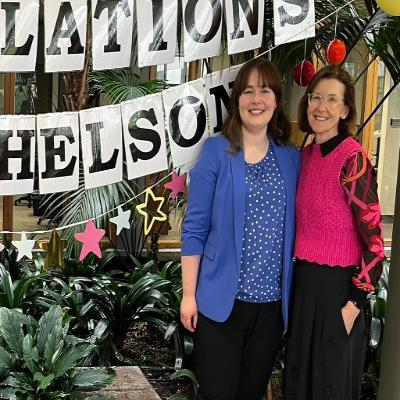A visit to ESB Science Blast 2020
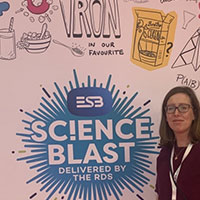 POI went along to Science Blast Dublin this year to see what all the fuss was about! ESB Science Blast, delivered by the RDS, is a non-competitive programme for primary school classes from 3rd to 6th class, that invites children to investigate the science behind a simple question that interests and excites them. Examples of this year’s projects included: ‘Can you taste the difference between branded and generic foods when blindfolded?’ (6th Class, Scoil Chronain Naofa, Dromakeenan), ‘How do you win a game of rock, paper, scissors?’ (6th Class, St Patrick’s Senior School, Skerries), and ‘Do tall people run faster?’ (6th Class, Presentation National School).
POI went along to Science Blast Dublin this year to see what all the fuss was about! ESB Science Blast, delivered by the RDS, is a non-competitive programme for primary school classes from 3rd to 6th class, that invites children to investigate the science behind a simple question that interests and excites them. Examples of this year’s projects included: ‘Can you taste the difference between branded and generic foods when blindfolded?’ (6th Class, Scoil Chronain Naofa, Dromakeenan), ‘How do you win a game of rock, paper, scissors?’ (6th Class, St Patrick’s Senior School, Skerries), and ‘Do tall people run faster?’ (6th Class, Presentation National School).
POI’s Communication & Public Engagement Manager, Dr. Fiona Lanigan, was invited to be on the judging panel for ESB Science Blast this year. She was highly impressed by the scientific thinking and communication skills of the participating classes, enjoyed blind tasting cornflakes, and was thoroughly schooled in the use of game theory to tackle a game of rock, paper, scissors!
The goal of the programme is to ignite children’s innate curiosity about the world around them, and promote curiosity, collaboration, creativity and critical thinking in children at primary school age to enable them to better respond to the challenges of the future. More than 12,000 children from 500 schools around the country participated in the Dublin ESB Science Blast 2020 event in the RDS in March 2020. More details can be found at www.esbscienceblast.com.
POI attend Irish Association of Cancer Research Annual Meeting
Following our POI team meeting on the 25th February, many of the team remained in Galway for the Irish Association of Cancer Research (IACR) Annual Meeting, which has become a highlight in the calendars of cancer researchers around Ireland and Irish researchers further afield.
This year, the conference ran parallel sessions tailored for biomedical researchers and nursing and allied health professionals, to build bridges between these research communities and encourage more interdisciplinary research and collaboration.
The first day kicked off with the IACR/EACR Early Career Researcher Symposium and Workshop, which aimed to support early-career researchers in areas such as career planning, grant-writing, mobility, communication, and embedding public and patient involvement in their research. The POI team manned an information stand during this session, to engage particularly with early-stage researchers and inform them about POI research and career opportunities.
The subsequent days were packed full of fantastic speakers from Ireland and worldwide, interspersed with networking sessions for old friends and colleagues to catch up. One of the highlights was the presentation of the IACR Award for Outstanding Contribution to Cancer Medicine and Research, which was presented to Prof. Joe Duffy, a stalwart of the cancer research scene in Ireland over the past 40 years.
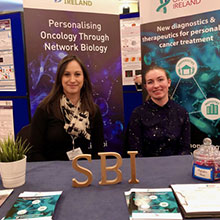
POI and CÚRAM partner for Science on Screen
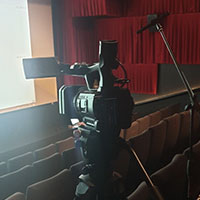 POI has partnered with CÚRAM, the SFI Research Centre for Medical Devices at NUI Galway and Galway Film Centre, in this year’s Science on Screen programme, which will commission a short scientific documentary focused on science and cancer research. The Information Day for Filmmakers took place on 26th February 2020 in Galway, where POI researchers and patient advocates shared their stories. The original timeline for the documentary has now been pushed back due to the COVID crisis, and is planned for release in mid-late 2021.
POI has partnered with CÚRAM, the SFI Research Centre for Medical Devices at NUI Galway and Galway Film Centre, in this year’s Science on Screen programme, which will commission a short scientific documentary focused on science and cancer research. The Information Day for Filmmakers took place on 26th February 2020 in Galway, where POI researchers and patient advocates shared their stories. The original timeline for the documentary has now been pushed back due to the COVID crisis, and is planned for release in mid-late 2021.
Science on Screen began in 2016, and aims to facilitate, promote and increase the inclusion of science, technology, engineering and maths (STEM) content in Irish film and TV production, and to explore methods of scientific ‘story telling’. The resulting documentaries are available for community and educational screenings nationwide. Since 2016, five Science on Screen films have been produced. All have been broadcast on RTE and or TG4, screened at numerous international film festivals and have scooped 6 international awards. The documentaries are used throughout the country at schools, for community screenings as well as at academic conferences and have reached an audience of over 1 million people to date.
Science on Screen 2020 is supported by a partnership between POI, CÚRAM, Galway Film Centre, and the Wellcome Institutional Strategic Support Fund based at UCD.
Entire POI team meets in Galway prior to IACR Conference
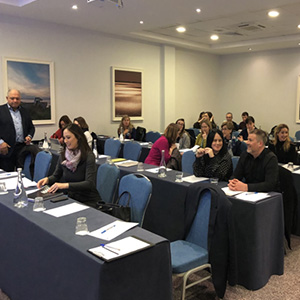 The entire POI team met in Galway on 25th February 2020, just prior to the annual IACR Conference. This gathering gave the team an opportunity to discuss progress thus far and plans for the future. Discussions circulated around the four main research areas of POI: Precision Diagnostics, Precision Therapeutics, Tumour Microenvironment and Resources and Infrastructure.
The entire POI team met in Galway on 25th February 2020, just prior to the annual IACR Conference. This gathering gave the team an opportunity to discuss progress thus far and plans for the future. Discussions circulated around the four main research areas of POI: Precision Diagnostics, Precision Therapeutics, Tumour Microenvironment and Resources and Infrastructure.
The Lead Investigator for each research area provided an overview of the projects within, and outlined any practical issues faced to date, followed by a discussion on the science and future plans. The meeting was followed by a networking session so that the team could get to know each other.
Little did we know what was ahead in March as the world shut down due to coronavirus! It was great to get an opportunity to catch up with the team before we all went into lockdown.
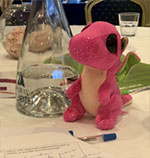
Nationwide visits POI
On Friday 7th February 2020, the RTÉ programme Nationwide broadcasted a segment relating to the ground-breaking work of Precision Oncology Ireland in fast-tracking the delivery of precision medicine in cancer.
The presenter, Anne Cassin, visited the UCD Conway Institute and Systems Biology Ireland to talk to the leaders of the POI programme, Professor Walter Kolch (Director) and Professor William Gallagher (Deputy Director). POI charity partners were also represented, with Dr. Robert O’Connor (Head of Research, Irish Cancer Society) talking about the motivation of getting involved in such a collaborative initiative, and how this can benefit both patients and wider society.
Nationwide also interviewed Professor Amanda McCann about the Patient Voice in Cancer Research (PVCR) programme which she has spearheaded since 2016. The PVCR provides a key opportunity for cancer patients/survivors, family members and cancer researchers to engage in a mutually beneficial dialogue.
The cancer patient community was represented by two patient advocates and PVCR steering committee members, Ramon Whelan and Ciara McNamara, who shared their lived experience of cancer.

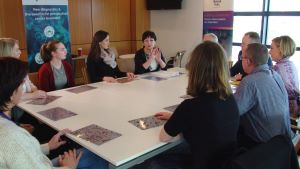
Choirs for Cancer
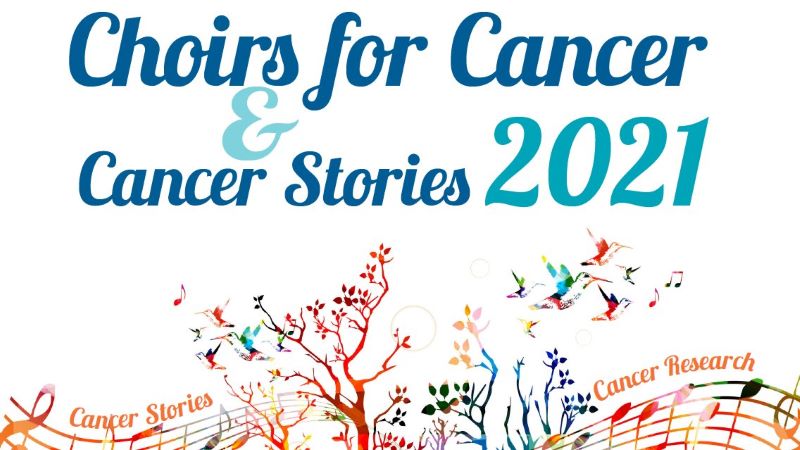
To mark World Cancer Day (04 February), hundreds of singers across the world will lend their voices in an online community tribute to those whose lives have been touched by cancer. ‘Choirs for Cancer 2021’ brings together cancer patients, family members, allied medical professionals and cancer researchers to share the story of their cancer journey. These stories will be interspersed with inspirational songs from multiple choirs from around the world, many linked with cancer support centres or cancer fundraising efforts. ‘Choirs for Cancer 2021’ also recognises the tireless work of patient advocates, including Sheila Kissane (UK) and Roberta Horgan (Ireland), as well as highlighting ongoing advances in cancer research. ‘Choirs for Cancer’ is jointly organised by Precision Oncology Ireland, the Patient Voice in Cancer Research and the All-Island Cancer Research Institute, together with the ongoing support of the ‘Choirs for Cancer’ committee.
Agenda
‘Choirs for Cancer 2021’ will hear singers, including school children, young adults, cancer patients and their families, from Boston, Philadelphia, New York; from Umeå, Sweden and Trelew, Argentina, as well as Ireland, the United Kingdom and Italy. We also hear poignant stories from individuals on their cancer journey; reinforcing the reality that cancer affects most families across the world in some degree. Cancer has no borders.
Each choir will sing a song with a special meaning to them on the theme of togetherness, followed by a combined choral performance of ‘From Now On’, a song from The Greatest Showman.
Choirs
- Snowflake Singers, Sweden
- Shout at Cancer Choir, UK
- The Quay of Sea Voices Choir (part of the Fine Voice Academy), UK
- The Philadelphia Boys Choir & Chorale and Philadelphia Girls Choir, USA
- Women's Voices Chorus, USA
- UCD Community Choir, Ireland
- The Line-Up Choir, Ireland
- Mason-Rice Chorus, USA
- Tenovus Cancer Care’s Sing with Us Choir, Wales
- St. Mary's Secondary School, Ireland
- Voci Fuori Dal Coro, Italy
- @WeAreInPuglia, Italy
- The Healthy Harmony Choir, Ireland
- The Municipal Choir of Trelew, Argentina
- Sing for Hope, USA
- Dublin Gospel Choir, Ireland
- Mount Sion School Choir, Ireland
- Loreto College, Ireland
- Adam Ezra Group, USA
- Sea of Change Choir, Ireland
- Solas Men’s Choir, Ireland
World Cancer Day
World Cancer Day, the global uniting initiative led by the Union for International Cancer Control, is marked each year on 4th February. World Cancer Day empowers people across the world to show support, raise our collective voice, take personal action and press governments to do more. The theme of World Cancer Day is ‘I Am and I Will’ - an empowering call-to-action urging for personal commitment, and representing the power of individual action taken now to impact the future. More than one third of cancer cases can be prevented. Another third can be cured if detected early and treated properly. By implementing resource-appropriate strategies on prevention, early detection and treatment, we can save up to 3.7 million lives every year.
Choirs for Cancer 2020
Choirs for Cancer brought together 10 choirs and more than 300 singers in a moving community tribute to those whose lives have been touched by cancer. The event, attended by more than 700 people, was held in O’Reilly Hall in University College Dublin on 4th February 2020, to mark World Cancer Day.
Choirs for Cancer brought together cancer patients, advocates, survivors and family members to share the story of their cancer journey. Cancer researchers also spoke of their motivation and progress towards finding new ways to prevent, diagnose and treat this devastating disease.
These powerful stories were interspersed with inspirational songs by 10 choirs from across the island of Ireland, many of whom were linked with cancer support centres, or had lost family members to cancer. Contributors included Mount Sion School Choir from Co. Waterford; the ARC Dublin ‘ARC Angels’ choir; the Healthy Harmony choir from Ennis; the Sing for Life Choir from Cancer Focus Northern Ireland; and the UCD Community Choir, among others. Each choir sang a song with a special meaning to them on the themes of care, hope, strength, love, loss and community, followed by a combined choral performance. Contributions from choirs, patients and well-wishers unable to travel on the day were featured in video clips shown in between performances. The event was co-hosted by RTE broadcasters, Miriam O'Callaghan and Marty Morrissey.
One of the highlights of the day was an emotional rendition of ‘Don’t give up on me’ from Mount Sion Choir, which they dedicated to terminal cancer patient John Wall, who, in his own words, is “Living with cancer, and not dying from it”. John was in the front row and the first to rise for a spontaneous standing ovation. He later said “Words just can't describe how honoured I was to hear Mount Sion Choir sing today. One of the most powerful & inspirational events I've ever attended”. Another high point was the powerful final group performance by all ten choirs, singing the song ‘Something Inside So Strong’ in one united voice.
Overall, the event was a resounding success, with overwhelmingly positive feedback from both contributors and attendees. One choir member later commented “Music is so powerful in so many ways and especially ensemble singing. I believe you have found a very special format with which to celebrate everyone whose path crosses cancer, in whatever form that may take”.
The event gained significant traction on social media (84,000 mentions of #choirsforcancer2020), and photo and video content featured on a number of media outlets including the Irish Times. The event was also chosen to feature in the World Cancer Day highlights video, which showed clips of selected events from around the globe.
This cancer awareness event was timed to coincide with the 20th anniversary of World Cancer Day, the global uniting initiative led by the Union for International Cancer Control. One in two people in Ireland today will develop cancer during their lifetime. The theme of World Cancer Day is 'I Am and I Will' – a statement of who you are and what is your personal commitment to act. It is a powerful reminder that we all have a role to play in reducing the global impact of cancer.
Choirs for Cancer was jointly organised by Precision Oncology Ireland and The Patient Voice in Cancer Research.
A short video of the event can be found here:
https://www.youtube.com/watch?v=SUxRSV7czrs
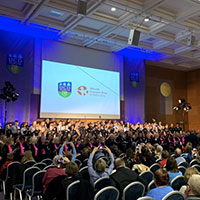
Choirs
St Mary’s Newport Secondary School Choir, Tipperary (Song: ‘Fight Song’)
https://www.youtube.com/watch?v=ULb0M6AKXVw
ARC Angel Choir, ARC Dublin Cancer Support Centre (Song: ‘Here comes the Sun’)
https://www.youtube.com/watch?v=GEJZPjnkcvg
Healthy Harmony Choir, Ennis (Song: ‘Fix You’)
https://www.youtube.com/watch?v=3w2ZM4zLk2Q
Mount Sion School Choir, Waterford City (Song: ‘Don’t give up on me’)
https://www.youtube.com/watch?v=faCX5ndLZSU
Solas Cancer Support Centre, Waterford (Song: ‘You are my sunshine’)
https://www.youtube.com/watch?v=CMGtXMuPVlM
Sing for Life Choir, Cancer Focus Northern Ireland (Song: ‘Falling Slowly’)
https://www.youtube.com/watch?v=MajUEVv1Ue4
Loreto College, Foxrock (Song: ‘Bridge Over Troubled Water’)
https://www.youtube.com/watch?v=Ginf6LTByqQ
Maria Lane Choir, Tallaght Cancer Support Centre (Song: ‘Stand by Me’)
https://www.youtube.com/watch?v=_7NzfvMWzj8
Hermione Hennessy – ‘Amazing Grace’
https://www.youtube.com/watch?v=JImsiTIW0AQ&t=702s
UCD Community Choir, University College Dublin – Song: ‘Count on Me’
https://www.youtube.com/watch?v=mpNZHWYDxLQ
Group Performance: ‘Something Inside So Strong’
https://www.youtube.com/watch?v=aRPt2CntEGc
Genomics Summit co-hosted in Dublin by GMI and UCD
Members of the POI team attended the Genomics Summit, held in the Aviva Stadium in Dublin on the 23rd January 2020, which was co-hosted by POI partner Genomics Medicine Ireland, and UCD Research and Innovation.
The agenda for the day provided some thought-provoking discussions around the potential of genomic medicine to tackle rare genetic disorders and cancer, as well as a focus on the skills and resources required to build a genomics infrastructure in Ireland.
Speakers were drawn from the spheres of academia, industry and patient advocacy, and included Dr. Howard Jacob, VP and Head of Genomic Research at Abbvie, and Prof. Robert Green, Director of the genomes2people Research Program, and Professor of Medicine at Harvard Medical School.
Launch of Precision Oncology Ireland
More than 90 scientists, cancer patients, academic, charity and industry representatives gathered on Tuesday, November 26th, to launch the new Precision Oncology Ireland research programme at University College Dublin. Minister of Business, Enterprise and Innovation, Heather Humphreys TD, was in attendance to say a few words in celebration and cut the ribbon. “I am delighted to announce this significant step forward for cancer research in Ireland,” Humphreys said.
“Precision Oncology Ireland is a significant investment, not only from Government, but also from the charity and industry partners in the programme, testimony to their conviction that this initiative will lead to the development of new cancer treatments and make a difference for future cancer patients and their families in our country. I look forward to seeing the impact that this research programme will have in the future,” she said.
Minister Humphreys address was preceded by a keynote talk from Dr. Cormac Owens from Children’s Health Ireland, as well as an overview on the programme from Professor Walter Kolch. Kolch is the director of Systems Biology Ireland and, now, Precision Oncology Ireland.
“In Precision Oncology Ireland, we will use cutting-edge technologies to generate unique genetic and molecular profiles for each patient’s cancer,” Kolch said. “Our key competitive advantage lies in the innovative computational methods we use to make sense of these profiles, and decipher what drives each individual cancer. The results of this programme will be better diagnostics, personalised cancer treatment and faster drug discovery and development.”
Precision (or ‘personalised’) medicine uses data about a person’s genes (genomics), along with additional information on their cancer, to understand the unique pathways of a disease or treatment response in that person. With this new science, doctors can prescribe the right treatment in a timely fashion, saving the wasted resources and time our current ‘trial and error’ method incurs, while greatly improving response rates.
The Deputy Director of the programme, Professor William Gallagher, hopes that this programme will allow cancer patients to benefit from research advances at an earlier stage: “We believe that Precision Oncology Ireland will accelerate the development of new diagnostics and therapies for cancer, and allow these advances to reach cancer patients in Ireland earlier. We will also involve patients in this work from the beginning, to ensure that their voice is heard in determining the most relevant research priorities.”
In Ireland, more than 40,000 people are diagnosed with cancer each year. Precision approaches to oncology give hope of improving cancer patients response rates and survival, reducing side-effects from therapy, and shortening hospital stays, balancing out any increased cost to the healthcare system. The National Cancer Strategy (2017-2026) called for the introduction of precision diagnostics and therapeutics into frontline cancer care.
Professor Kolch added: “A significant proportion of our funding is down to the generosity of the Irish public in donating and fundraising, via the participation of six of the leading cancer charities in Ireland, the first time they have come together to support a programme of this scale. We want to ensure that their hard work delivers results for cancer patients in Ireland.”
Many in attendance at the launch commented on the powerful stories from the evening’s “Patient Perspectives” panel of cancer patients, survivors and family members. The panel featured Sheila Murphy, an oesophageal cancer survivor; Edel Cannon, a metastatic breast cancer patient; Ramon Whelan, a testicular cancer survivor, Dr. Alan Pearson, the parent of a child with neuroblastoma, and Jan Rynne a CLL patient, all of whom volunteered to discuss their experiences with cancer and the importance of research initiatives such as Precision Oncology Ireland in future treatment of the disease.
Cancer survivor and patient advocate Ramon Whelan spoke of the importance of this game-changing research for patient’s lives: “I’m delighted to see researchers, charities and industry coming together in Ireland to focus as a group on the problems in cancer treatments. Cancer patients want to become more involved in their own treatment decisions, and more personalised diagnostics and treatments are essential for this to happen.”
The afternoon presentations were followed by a reception and photo session of all the representative groups and organisations. The launch and associated press release was picked up by a number of media outlets and profiled in the national newspapers and online news sites.
Research Seminars: a busy start to the year!
 POI hosted seminars by a number of prestigious international speakers in the early months of 2020, kicking off with Dr. Paul Brennan, Head of the Genetics Section and the Genetic Epidemiology group at the International Agency for Research on Cancer in Lyon. Dr. Brennan’s research applies genetics to understand more about environmental, lifestyle and infectious causes of cancer, with a particular focus on cancers of the upper-digestive tract, kidney and pancreatic cancers. His talk was entitled: ‘What can whole genome sequences of tumours tell us about the causes of cancer?’.
POI hosted seminars by a number of prestigious international speakers in the early months of 2020, kicking off with Dr. Paul Brennan, Head of the Genetics Section and the Genetic Epidemiology group at the International Agency for Research on Cancer in Lyon. Dr. Brennan’s research applies genetics to understand more about environmental, lifestyle and infectious causes of cancer, with a particular focus on cancers of the upper-digestive tract, kidney and pancreatic cancers. His talk was entitled: ‘What can whole genome sequences of tumours tell us about the causes of cancer?’.
On Tuesday 11th February, POI collaborated with the regular POI CLASS Seminar Series at the UCD Conway Institute to host Dr. Aedín Culhane, Senior Research Scientist at the Dana-Farber Cancer Institute at Harvard TH Chan School of Public Health. Dr. Culhane develops computational approaches to integrate and analyse large scale genomics data to discover cross-talk between tumours and their microenvironment, and she spoke about ‘Mapping the Tumor-immune landscape with multiple layers of data’.
On Monday 24th February, we were privileged with the company of Dr. David Lynn, Professor of Medical Informatics at Flinders University in South Australia. Prof. Lynn leads a multidisciplinary group of computational and experimental researchers who apply advanced systems biology and experimental immunology approaches to investigate the immune system and cancer. His talk focused on how ‘The gut microbiota influences immune responses systemically in a broad range of contexts – from infant vaccination to cancer immunotherapy’, and was very well received.
Unfortunately, following a busy start to the year, early March marked the beginning of a long period of uncertainty, and in-person seminars became an impossibility. Nevertheless, we quickly adapted, and held our first virtual research seminar in conjunction with the UCD Conway Institute CLASS seminar series, on Tuesday 7th April. The speaker was Dr. Liam Faller, Group Leader at the Netherlands Cancer Institute, and himself a former alumni of the UCD Conway Institute. Dr. Faller’s research group studies the role that RNA translation plays in cancer, with a particular focus on colorectal cancer. His talk was entitled ’Regulation of gene expression by RNA translation in the intestinal epithelium’.
The transition to an online platform went smoothly, and we had an impressive turnout with great engagement from attendees over the Q&A session. We also found that there are some advantages to holding these talks online, particularly for a national research programme like POI, as they are more accessible to our research team, based all over the country, and even to collaborators worldwide. This format will certainly be the ‘new normal’ for the foreseeable future, and we look forward to hearing from further talented researchers over the coming months.
Industry Seminar - Prof. Helen McCarthy
Precision Oncology Ireland hosted our first Industry Research Seminar on Tuesday 9th June, showcasing the ground-breaking work of one of our partners, Prof. Helen McCarthy of Phion Therapeutics. Prof. McCarthy holds the Chair of Nanomedicine at Queen’s University Belfast, is the Director of Internationalisation in the School of Pharmacy, Associate Dean of the Graduate School and CEO of pHion Therapeutics. Prof McCarthy’s research has focused on the development of non-viral delivery systems for nanomedicine applications. Her talk was a mine of information for any researcher interested in the translation of their work from the academic to the industrial sphere. She focused on the 5 W’s of her spin-out company, Phion Therapeutics (www.phiontx.co.uk): ‘Who, What, When, Where and Why?’.
The biomimetic peptide delivery systems being developed at Phion have wide-spread utility, and are designed to overcome the extra and intracellular barriers, so that the macromolecular payload can be delivered at the destination site in order to exert the optimal therapeutic effect. Current research projects involve gene therapy for metastatic deposits; miRNA therapeutics for oncology and wound healing applications; mRNA and DNA vaccination strategies; repurposing of bisphosphonates and regeneration of bone by increasing the bioavailability of ceramics.
Phion Therapeutics are a POI partner, and within the programme are working with Prof. Tracy Robson at RCSI to develop a novel tumour-specific targeted nanoparticle delivery system to send an anti-angiogenic and anti-migratory gene, FKBPL, directly to ovarian tumours.
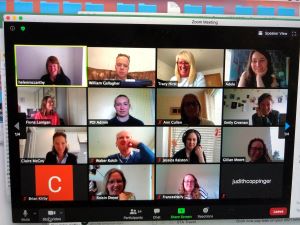
Public talk on Lobular Breast Cancer
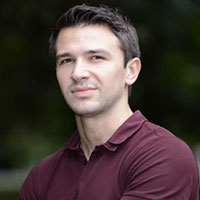 On Tuesday 16th June 2020, Precision Oncology Ireland hosted our first public talk together with our charity partner, the Irish Cancer Society. The speaker was a fantastic Irish breast cancer researcher, Dr. Damir Vareslija, from the Royal College Of Surgeons in Ireland.
On Tuesday 16th June 2020, Precision Oncology Ireland hosted our first public talk together with our charity partner, the Irish Cancer Society. The speaker was a fantastic Irish breast cancer researcher, Dr. Damir Vareslija, from the Royal College Of Surgeons in Ireland.
Damir is a Research Fellow and Principal Investigator in the Department of Surgery in Royal College of Surgeons in Ireland. He undertook his Science Foundation Ireland-funded PhD training under the tutelage of Prof Leonie Young and Prof Arnold Hill. Damir has been involved in numerous translational collaborative projects funded by Breast Cancer Ireland and the Irish Cancer Society’s BREAST-PREDICT Collaborative Cancer Research Centre, during which his work was published in several leading clinical and biomedical journals including JNCI, JAMA Oncology, Oncogene and Clinical Cancer Research. His current research, supported through Breast Cancer Now, Enterprise Ireland, Breast Cancer Ireland and the Irish Cancer Society, is focused on endocrine treatment resistance and metastatic breast cancer with a particular focus on brain metastases.
Damir gave an enlightening talk about Invasive Lobular Carcinoma, entitled: “Biological and Clinical Differences within Breast Cancer: A story of a sneaky subtype”. The talk was tailored for a non-scientific audience, and garnered particular interest among the lobular cancer community in Ireland and worldwide. Over 80 attendees tuned in on the day, with a further 70 watching the webinar, which was recorded, at a later date. Feedback from attendees was overwhelmingly positive, with great engagement during the lively Q&A session, and POI look forward to hosting similar events showcasing the great work of Irish researchers in the future.
The webinar recording can be viewed here
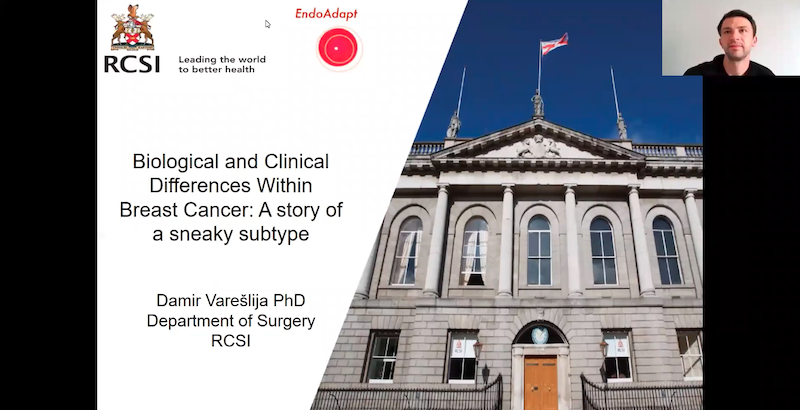
Analysis Platform to support POI research
Published 31st July 2020
A pioneering national Comprehensive Molecular Analysis Platform (CMAP), funded by Science Foundation Ireland (SFI) under their Research Infrastructure Programme, will underpin research in chemistry, the bioeconomy, and precision oncology.
The CMAP platform has been awarded €2.7 million by SFI, and incorporates all 9 Irish Universities, 5 SFI Centres, 6 Institutes of Technology, 6 Irish Charities and >20 companies, creating critical mass and enhancing Ireland’s competitiveness to participate in and lead international research.
This technology will support scientists characterising food ingredients, developing new drugs, identifying environmental contaminants, and designing new diagnostic tools and therapies that enable personalised treatments of cancer patients. It is open to academic, industry and not-for-profit researchers, and will be situated within UCD, at locations including the UCD Conway Institute, Systems Biology Ireland, the UCD School of Chemistry, and the Daedalus Building.
The need for precise molecular characterisation and quantitation has become an essential research capacity across many sectors, and CMAP will provide the cutting-edge research infrastructure to enable this, particularly through the use of Mass Spectrometry. Initially used for the analysis of small molecules, chemicals and metabolites, this highly accurate technique can now be applied in the identification and quantification of much larger structures, including peptides and carbohydrates.
"The unique selling point of CMAP is its capability to comprehensively deliver, integrate and functionally interpret omics and deep molecular analysis data”, said Lead Investigator on the award, Prof. Walter Kolch, Director of Systems Biology Ireland and Precision Oncology Ireland, based at University College Dublin.
“CMAP will allow us to meet evolving research challenges, and enhance our appeal to industry partners, as it will be the only technology platform in Ireland that offers integrated and comprehensive molecular analysis in the omics and chemical space", Prof. Kolch added.
CMAP feeds into 5 national priority areas supporting strategic sectors, such as chemistry, bioeconomy, synthetic biology, food and health, and precision medicine, supporting discovery and innovation in research from molecules to microorganisms and humans.
Access to state-of the-art CMAP infrastructure and support will be open to the research team within POI, boosting their research capabilities and encouraging a more collaborative approach nationally. The involvement of research institutes on a national level facilitates inter-institutional sharing of this crucial research infrastructure, allowing the optimum use of these resources, as well as sharing of technical expertise and analysis pipelines.
CMAP further details:
CMAP will supply essential infrastructure to five SFI Research Centres (Beacon Bioeconomy Centre, Synthesis and Solid State Pharmaceutical Centre (SSPC), CURAM, APC Microbiome, INFANT). CMAP further supports Precision Oncology Ireland, a major strategic partnership programme supported by SFI; Systems Biology Ireland (SBI), a major previous SFI investment; the EI funded Food for Health Ireland (FHI) centre; the Conway Institute, Ireland’s largest biomedical institute, which has provided advanced technology services to UCD and Ireland for >10 years; several EU and other large-scale grants; and the INSTRUCT Advanced Community.
The equipment funded includes:
- Two high resolution mass spectrometers (MS) for protein identification and quantitation;
- A MALDI-ToF MS for high throughput identification of microorganisms and molecules from bio-based resources, animal and human samples;
- Two Quadrupole MS for analysis of products from chemical synthesis and high resolution structure elucidation;
- A Liquid Chromatography MS for the identification and quantitation of metabolites and nutritional ingredients;
- An automated Immunoprecipitation (IP) system for the elucidation of protein-protein interactions
- A Computing Facility for the associated data analysis.
Irish breast cancer study highlights potential new treatment approach
Published 1 October 2020
A new study by Irish researchers may pave the way to developing a more effective means of treating patients with the most common form of breast cancer
The promising findings are described in a paper published in the leading journal “Cancer Research”, a journal of the American Association for Cancer Research, in a study headed by researchers from RCSI University of Medicine and Health Sciences, and UCD, who led an international team of colleagues from the Netherlands Cancer Institute and Oxford University, among others.
Up to three-quarters of breast cancer patients are diagnosed with what is known as the ‘hormone receptor-positive’ form of the disease, which affects more than 2,000 women each year in Ireland. While existing hormone receptor-targeting therapies such as tamoxifen are effective for many patients, some do not respond to the treatment or prove resistant to it if their cancer returns. Ultimately, almost half of patients receiving hormone treatments experience a relapse of their disease, and researchers are urgently looking for new treatment options for these patients.
The research team, co-led by Prof Darran O’Connor from RCSI and Prof William Gallagher from UCD, discovered a potential new treatment approach for patients who are resistant to hormone therapy. The study found that a protein called ‘USP11’ plays a central role in the growth of hormone receptor-positive breast cancer cells, and that targeting this protein may provide a new form of treatment to help stop this growth in a way never attempted previously.
Although studies remain at an early stage, it is hoped this finding could eventually help prompt a significant step forward in treatment options for patients for whom existing hormone therapy has proven unsuccessful.
The study is a result of the Irish Cancer Society-funded BREAST-PREDICT programme which brought experts from around the country together to work on breast cancer research projects. Some of the programme’s activities are continuing as part of the ground-breaking Precision Oncology Ireland consortium of 5 universities, 8 companies, and 6 charities, including the Irish Cancer Society, which aims to develop new diagnostics and therapeutics for personalised cancer treatment.
Prof Darran O’Connor said: “The study represents an early indication of a possible new treatment strategy for a group of breast cancer patients whose cancer comes back but has acquired changes that mean traditional anti-hormone therapy will no longer work.”
Lead author Dr Lisa Dwane from RCSI said: “Understanding how breast cancer is controlled at the cellular level is key for disease management and finding new therapies for patients. In this study, we found that the protein USP11 can regulate hormone-driven breast cancer and with further research, may represent a point of therapeutic intervention.”
Study joint senior author Prof William Gallagher and Director of the BREAST-PREDICT programme commented: "This ground-breaking study by Dr Dwane and colleagues is a perfect example of the benefit of working in a team-based manner to advance cancer research.”
Dr Robert O’Connor, Director of Research at the Irish Cancer Society, said: “This work is yet another example of the high quality, impactful cancer research that public support allows happen in Ireland.”
October marks the beginning of Breast Cancer Awareness Month, and members of the public can show their support for cutting-edge breast cancer research such as this by logging on and donating at www.Cancer.ie/CupsAgainstBreastCancer.
ENDS
This press release was covered in the 'Irish Independent' on Friday 2nd October 2020. See full article here.
About Irish Cancer Society Research
The Irish Cancer Society is the largest voluntary funder of cancer research in Ireland, and we are committed to improving the lives of cancer patients in Ireland through research. The Irish Cancer Society funds the work of over 100 cancer researchers in leading institutions and hospitals all across Ireland, and funds projects across the range of research areas in line with our mission to ensure fewer people get cancer, and those that do have better outcomes.
Our vision is that cancer research will be at the heart of cancer care. This will ensure that patients diagnosed with cancer in Ireland will have access to the most cutting-edge treatments and the best possible care.
About BREAST-PREDICT
The BREAST-PREDICT Collaborative Cancer Research Centre was a country-wide collaboration between experts in the area of breast cancer research, funded by the Irish Cancer Society, which ran between 2013-2019. The first ‘virtual centre’ of its kind in the country, BREAST-PREDICT brought together researchers from six academic institutions across Ireland: UCD, TCD, RCSI, DCU, NUIG and UCC, and a nationwide clinical trials group, Cancer Trials Ireland (formerly ICORG). As a multi-disciplinary centre, it united diverse breast cancer experts with different skills to work towards a common goal.
About Precision Oncology Ireland
Precision Oncology Ireland is a consortium of 5 Irish universities, 8 companies, and 6 Irish cancer research charities, including the Irish Cancer Society, aiming to develop new diagnostics and therapeutics for the personalised treatment of cancer. The Consortium is part-funded by Science Foundation Ireland under their Strategic Partnership Programme, is co-ordinated by Systems Biology Ireland, and launched in November 2019.
The outcomes of this research programme will range from diagnostic tests for cancer based on personal molecular markers, novel drugs which specifically target cancer cells, and improved synergistic drug combinations. The programme will also provide key infrastructural supports to researchers, co-ordinating access to tumour biobanks, and allowing access to state-of-the-art technologies. More information can be found at www.precisiononcology.ie.
POI Public talk series for Cancer Week Ireland
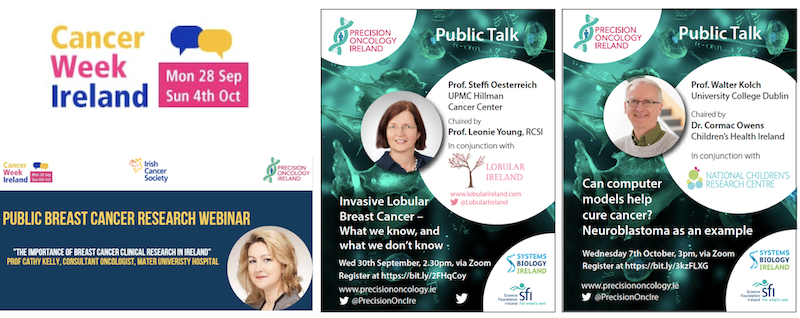
Professor Catherine M. Kelly is a Consultant Medical Oncologist at the Mater Misericordiae University Hospital and Associate Clinical Professor at University College Dublin. Prof. Kelly is the Medical Director of the Mater Hospital Cancer Trials and Research Unit. She is also Co-Chair of the Breast Cancer Group of Cancer Trials Ireland. Prof. Kelly was the recipient of the Irish Cancer Society, Clinician Researcher Leadership Award 2018.
This event was recorded and can be accessed by emailing research@irishcancer.ie
This talk was recorded and is available here.
Wednesday 7th October, 3pm, via Zoom.
"Can computer models help cure cancer? Neuroblastoma as an example".
On 7th October 2020, Precision Oncology Ireland hosted a public talk focused on the latest cutting edge scientific research on Neuroblastoma, a rare but devastating childhood cancer, from world-leading precision medicine researcher Prof. Walter Kolch from University College Dublin. The talk was followed by an open Q&A session chaired by Consultant Paediatric Oncologist Dr. Cormac Owens from Children's Health Ireland. This event was organised in conjunction with the National Children's Research Centre, tailored for a lay audience, and was open to anyone with an interest in cancer research or neuroblastoma.
Researchers and Patients in Conversation
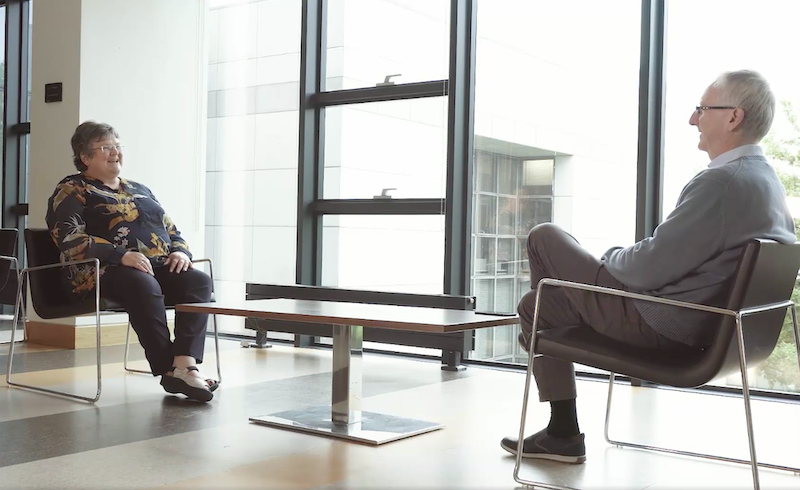
POI Governance Committee meet for first time
Published 27th November 2020
The POI team are privileged to have the guidance of our Governance Committee (GC), who met for the first time on Friday 27th November. This independent group will provide oversight of POI’s progress and strategic vision, evaluate performance, & ensure a clear direction for the consortium in the years ahead
The GC includes high-profile figures from political, academic, industry, clinical & patient advocacy circles on the island of Ireland, bringing a diverse set of skills & experience to the table.
Chair of the Committee is David Byrne, Senior Counsel, former EU Commissioner for Health & Consumer Protection & Attorney General of Ireland. He is a founding member & Co-Chair of the European Alliance for Personalised Medicine
GC members include healthcare expert Tommy Bracken; Consultant Endocrinologist Prof. Brendan Buckley; Consultant Medical Oncologist at University Hospital Limerick, Prof. Linda Coate; Associate Pro-Vice-Chancellor at Queen's University Belfast and Scientific Director of DATA-CAN Prof. Mark Lawler; College Principal at UCD College of Health and Agricultural Sciences Prof. Cecily Kelleher, Consultant Medical Oncologist at the Mater Hospital Prof John McCaffrey, CEO of IPPOSI Dr. Derick Mitchell, CEO of NIBRT Dr. Darrin Morrissey, and Patient advocate and founder of CLL Ireland Jan Rynne.
We are lucky to have such a wealth of experience on board, and we extend our gratitude to our GC members for giving of their time, expertise and passion to make our vision a reality!
Find out more about our Governance Committee members here.
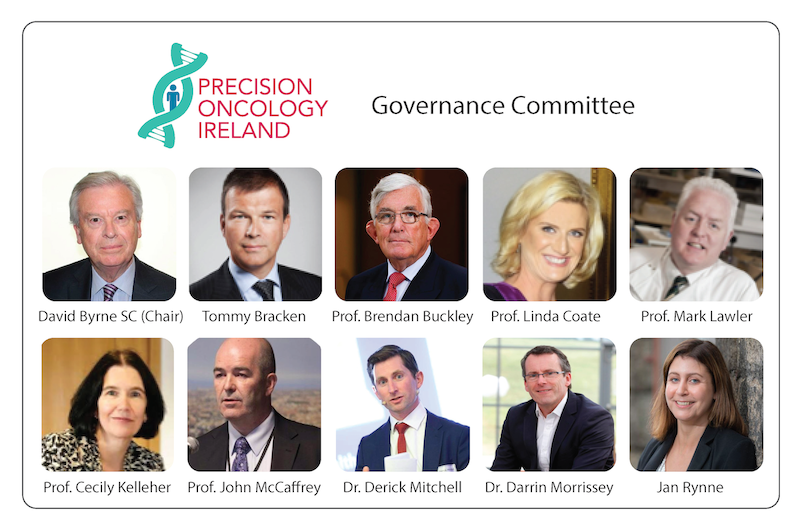
Launch of a new EU-funded training programme, ‘DevelopMed’
PRESS RELEASE
€1.32 million in EU funding to support training the next generation of research leaders in precision oncology
Launch of a new MSCA COFUND Programme, ‘DevelopMed’
9 December: Today marks the official launch of a new Marie Sklodowska-Curie (MSCA) COFUND programme, ‘Developing the Next Generation of Research Leaders in Precision Oncology’ (DevelopMed). The MSCA COFUND programme was officially launched by Prof. Cecily Kelleher, College of Health and Agricultural Sciences and Prof. Orla Feely, VP for Research, Innovation and Impact at UCD. DevelopMed, which is coordinated by Systems Biology Ireland (SBI) in UCD, entails an EU investment of €1.32 million.
DevelopMed is a training programme which will support the development of high calibre research fellows who are at an early stage of their careers. Fellows will be conducting research throughout Ireland in Precision Oncology within the themes of Diagnostics, Drug Development and the Tumour Microenvironment. Institutions hosting fellows include University College Dublin, the National University of Ireland Galway, University College Cork and the RCSI University of Medicine and Health Sciences.
Recent figures from 2018 show that Europe bears 25% of the global cancer burden despite encompassing only 9% of the world population. With increasing life expectancy it is anticipated that cancer will soon become the leading cause of mortality within the European Union. Technological advancements in genomics, imaging, computational modelling and artificial intelligence provide a powerful toolkit for cancer researchers. However, the cancer research community is faced with a shortage in skilled scientists and clinicians able to deploy these technologies in the fight against cancer.
DevelopMed is a game-changing interdisciplinary training programme providing a cutting-edge research environment for the future world leaders in precision oncology. The prestigious fellowships will facilitate training through research to fully equip fellows with the skills and intersectoral competencies to enhance their career development prospects. Fellows will also partake in 3-6 month secondments at global research-performing organisations in industry, academic, clinical and charity settings.
Remarking on the new programme, the DevelopMed Programme Coordinator, Prof. Walter Kolch said: “We are thrilled with the opportunity to train the next generation of leaders in precision oncology research. DevelopMed provides a unique opportunity to develop excellent scientists and clinicians and to inspire in them an entrepreneurial, cross-disciplinary problem-solving mindset for tackling cancer.”
DevelopMed builds on a previous MSCA COFUND programme coordinated by SBI, ‘TopMed10’. This supported nine postdoctoral fellows in personalised medicine research projects, who have now moved on to prestigious positions in academia and industry. DevelopMed will also interact closely with Precision Oncology Ireland, a Science Foundation Ireland Strategic Partnership Programme with partners in the industry and charity sectors.
Supporting the initiative at the launch event, Prof. Orla Feely said: “It is great to see the success that has been delivered from TopMed10 in terms of training outstanding researchers. DevelopMed builds strategically on this previously successful programme and offers a wonderful opportunity for fellows. We can expect to see excellent researchers come through this programme and go on to enormously rewarding careers, delivering important impact in the exciting area of precision oncology.”
Prof. Kolch added: “We look forward to the many interactions between DevelopMed and Precision Oncology Ireland. This consortium of academics, industry and charity partners presents an incredible network for DevelopMed fellows and positions them to deliver extraordinary impact for Ireland and the EU.”
ENDS
For further information, please contact:
Prof. Walter Kolch, SBI Director, at developmed@ucd.ie
Additional Information:
DevelopMed is a Marie Sklodowska-Curie (MSCA) COFUND programme titled ‘Developing the Next Generation of Research Leaders in Precision Oncology’. This project has received funding from the European Union’s Horizon 2020 research and innovation programme under the Marie Skłodowska-Curie grant agreement No 945425.
This communication reflects only the author's view and the Agency and the Commission are not responsible for any use that may be made of the information it contains.
TopMed10, is a MSCA programme coordinated by SBI. Further information can be found on the programme website (https://www.ucd.ie/topmed10/).
Invisible Spectrum - Breaking down barriers to STEM participation in Ireland
Published 6th January 2021
While a good deal of effort has been expended in Ireland in opening up the fields of Science, Technology, Engineering and Maths to a more diverse group in terms of gender, the same cannot be said for ethnicity. The Irish Department of Education’s 2016 report on STEM Education did not mention ethnicity as a barrier to STEM uptake. Studies worldwide have found wide variations in STEM uptake between different ethnic minorities. For example, a UK study found that Pakistani, Bangladeshi, Caribbean and Black African pupils aged 7-11 performed below the national average in science1. In the UK workforce, the most under-represented group in STEM roles were Bangladeshi, at 1.6% of their population, compared to 5% for White ethnic2. Differences in STEM uptake by ethnicity are complex, and strongly interlinked with socio-economic status, family background, and cultural factors.
There can also be specific barriers within minority communities in terms of cancer. Ethnocultural beliefs around cancer stigma, fear, and fatalism are more prevalent within ethnic minority groups, often resulting in lower uptake of cancer screening3, reduced cancer symptom awareness4, delayed presentation5, and in some cases, poorer survival6. There has been little to no research in Ireland focused on barriers to access within minority ethnic groups. Indeed, the National Cancer Registry in Ireland do not collect information on ethnicity, and thus, rates of cancer incidence and mortality within ethnic minorities are unknown. Minority groups are effectively ‘invisible’ in Irish cancer research, and we believe that engaging with these communities is a small step towards a more inclusive research agenda.
With this in mind, POI aimed to reach out to specific minority ethnic community groups for Science Week 2020, with a tailored programme of activities aimed at improving awareness of STEM and cancer research. As a research programme at the cutting edge of precision medicine for cancer, POI sees the need to build a strong public engagement agenda, as precision oncology has the potential to positively impact the health and wellbeing of current and future cancer patients and their families. We believe that science should be accessible to all, and the potential disparity in access and understanding of scientific and healthcare information in minority ethnic groups should be addressed.
The ’Invisible Spectrum’ programme was co-designed with minority ethnic community leaders to meet the needs of each representative group, and was supported by Science Foundation Ireland under its Science Week programme for November 2020.
Due to COVID restrictions, the planned programme of fun family activities had to be moved to an online workshop format. Based on the input of the community group leaders, the initial goal of enhancing understanding and appreciation of scientific research was expanded to include some content on cancer screening and symptom awareness. A gender-segregated discussion session was also added, as many community members would not feel comfortable sharing in a mixed-gender group due to sociocultural practises. All content was translated either in writing or verbally into the preferred language of the community group. To include all of the family, and compensate for the move to a virtual event, we also held a science-themed children’s art competition, aligned with the online workshop.
The workshop began with a brief lay introduction to precision oncology, including a 3D movie of the tumour environment. This was followed by short multi-lingual talks by researchers who are members of the minority ethnic community group. An interactive workshop on the use of biomarkers for precision oncology concluded the research portion of the workshop. Participants were then transferred to gender-segregated breakout rooms, where a trained nurse or facilitator gave a short talk on cancer screening and symptom awareness, with an opportunity to ask questions and discuss any issues within the group. Finally, participants were transferred back to the main workshop room, where the results for the children’s art competition were announced, before closing the event.
The feedback we received from participants following the event was overwhelmingly positive, with many commenting that they would have preferred a longer session to better avail of the opportunity to interact with the researchers. Overall, 85% of participants surveyed following the event said that they would attend a similar event in the future, and 80% felt more informed about science and cancer research following the event. More than 90% said they would now be more aware of cancer symptoms, and >90% were more likely to encourage their children to pursue STEM careers having attended the event.
In the longer term, we hope that this event will effectively act as a pilot event for a broader programme of public engagement activities. The key to diverse and inclusive public engagement is flexibility, sensitivity, and building trust within the community. We hope that our learnings from this event will inform and shape our future public engagement strategy, with a particular focus on engaging with underserved minority communities.
The POI team would like to thank the leaders and members of the community groups who took part in the Invisible Spectrum events, as well as our colleagues at University College Dublin and the Irish Cancer Society for their support with facilitating the various event sessions.
- CASE: Improving Diversity in STEM report, 2014
- STEM Choices: Equality & Diversity: Ethnicity. Department of Education, UK, 2009
- Marlow et al., J Fam Plann Reprod Health Care (2015) 41(4):248-54
- Niksic et al., British Journal of Cancer (2016) 115:136–144
- Yedjou et al., Int. J. Environ. Public Health (2017) 14:486
- Cancer Incidence and Survival By Major Ethnic Group, England, 2002 – 2006. NCIN/CRUK
Choirs for Cancer 2021
Published 5th February 2021
To mark World Cancer Day (04 February), hundreds of singers across the world lent their voices in an online community tribute to those whose lives have been touched by cancer. ‘Choirs for Cancer 2021’ brought together cancer patients, family members, allied medical professionals and cancer researchers to share the story of their cancer journey. These stories were interspersed with inspirational songs from multiple choirs from around the world, many linked with cancer support centres or cancer fundraising efforts. ‘Choirs for Cancer 2021’ also recognised the tireless work of patient advocates, including Sheila Kissane (UK) and Roberta Horgan (Ireland), as well as highlighting ongoing advances in cancer research. ‘Choirs for Cancer’ was jointly organised by Precision Oncology Ireland, the Patient Voice in Cancer Research and the All-Island Cancer Research Institute, together with the ongoing support of the ‘Choirs for Cancer’ committee.
Agenda
‘Choirs for Cancer 2021’ heard singers, including school children, young adults, cancer patients and their families, from Boston, Philadelphia, New York; from Umeå, Sweden and Trelew, Argentina, as well as Ireland, the United Kingdom and Italy. We also heard poignant stories from individuals on their cancer journey; reinforcing the reality that cancer affects most families across the world in some degree. Cancer has no borders.
Each choir sang a song with a special meaning to them on the theme of togetherness, followed by a combined choral performance of ‘From Now On’, a song from The Greatest Showman.
Choirs
- Snowflake Singers, Sweden
- Shout at Cancer Choir, UK
- The Quay of Sea Voices Choir (part of the Fine Voice Academy), UK
- The Philadelphia Boys Choir & Chorale and Philadelphia Girls Choir, USA
- Women's Voices Chorus, USA
- UCD Community Choir, Ireland
- The Line-Up Choir, Ireland
- Mason-Rice Chorus, USA
- Tenovus Cancer Care’s Sing with Us Choir, Wales
- St. Mary's Secondary School, Ireland
- Voci Fuori Dal Coro, Italy
- @WeAreInPuglia, Italy
- The Healthy Harmony Choir, Ireland
- The Municipal Choir of Trelew, Argentina
- Sing for Hope, USA
- Dublin Gospel Choir, Ireland
- Mount Sion School Choir, Ireland
- Loreto College, Ireland
- Adam Ezra Group, USA
- Sea of Change Choir, Ireland
- Solas Men’s Choir, Ireland
World Cancer Day
World Cancer Day, the global uniting initiative led by the Union for International Cancer Control, is marked each year on 4th February. World Cancer Day empowers people across the world to show support, raise our collective voice, take personal action and press governments to do more. The theme of World Cancer Day is ‘I Am and I Will’ - an empowering call-to-action urging for personal commitment, and representing the power of individual action taken now to impact the future. More than one third of cancer cases can be prevented. Another third can be cured if detected early and treated properly. By implementing resource-appropriate strategies on prevention, early detection and treatment, we can save up to 3.7 million lives every year.
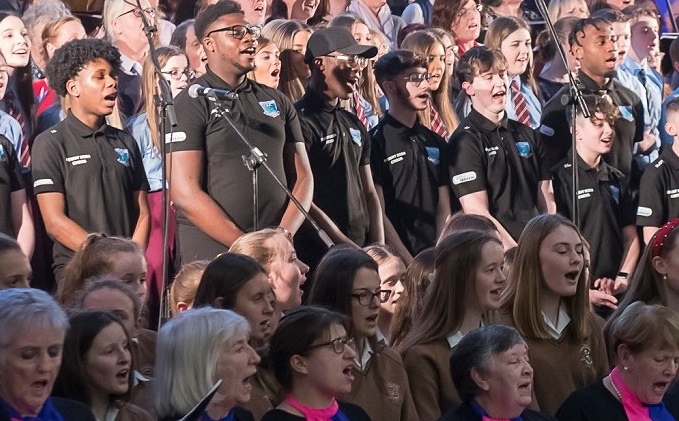
Here is a snapshot of members from the many choirs involved in last year's event in O'Reilly Hall, UCD coming together on stage to sing the final song of the day.
POI Industry webinar ''Spatial Transcriptomics: Painting a Molecular Picture'
Published 30th March 2021
Precision Oncology Ireland hosted an Industry Webinar entitled 'Spatial Transcriptomics: Painting a Molecular Picture' on Tuesday the 16th of March from 2 - 4pm GMT via Zoom. Understanding the cellular and molecular heterogeneity of tumour tissues continues to be a challenge for high-throughput molecular profiling technologies. Spatial transcriptomics can provide the molecular identity of complex tissues consisting of various cell types. This mini-symposium offered an overview and update of the field by academic and industry leaders.
A recording of the event can be viewed here (viewing registration is required).
Dr. Susan Heavey's slides from the webinar are available to be downloaded here: Dr. Susan Heavey's slides
Anthony Zucca's slides from the webinar are available to be downloaded here: Anthony Zucca's slides
The webinar was chaired by Prof. William Gallagher, University College Dublin & Prof. Paul Murray, University of Limerick and we heard from the following speakers:
- Prof. Walter Kolch, University College Dublin
- Dr. Susan Heavey, University College London
- Anthony Zucca, NanoString Technology
- Nachiket Kashikar, Resolve BioSciences GmbH
- Dr. Aedin Culhane, Dana-Farber Cancer Institute & Harvard University
POI was delighted to have these speakers participating in the event. Below we have included further information on several of the event speakers and the topics that were discussed.
Walter Kolch
Prof. Walter Kolch is Director of Systems Biology Ireland and Precision Oncology Ireland. A leading international proponent of precision medicine, he is internationally recognised for his cutting-edge research using systems approaches to understand signalling networks and is ranked 2nd in the world in precision medicine, 6th in systems medicine, 23rd in signal transduction and 40th in proteomics (Google Scholar). His current interest is focusing on using computational modelling and omics approaches to analyse biological networks to elucidate the molecular mechanisms of cancer and other diseases in order to design new approaches to personalised diagnostics and treatment based on a systems level, molecular mechanistic understanding. Using mathematical and computational modelling to analyse the network structure of cell signalling, the aim is to predict responses to perturbations (such as drugs), define the most sensitive points for interference by drugs, and analyse the specificity of signalling and adaptation processes.
Susan Heavey
Prof. Susan Heavey a lecturer in translational medicine at University College London interested in use of 3D ex vivo models for drug development and personalised medicine and to predict treatment response in cancer. She uses an integrative approach to solve clinical research problems, prioritising multidisciplinary collaborations with robotic surgeons, radiologists, pathologists, bench and computational scientists. Prof. Heavey developed the MRI guided prostate cancer biobanking pathway PEOPLE, which has to date recruited over 200 cases for a range of downstream 3D model projects within UCL, nationally and internationally, as well as contributing 100 cases to Genomics England's 100,000 Genomes Project. Her current travelling fellowship is SCREEN, where she is using the ex vivo culture approach to compare emerging 2D/3D spatial genomics technologies, gaining training in cutting edge basic science as a visiting scientist in Cold Spring Harbour Laboratory, USA, as well as furthering her drug development projects within UCL.
Anthony Zucca
Anthony Zucca, a Technical Sales Specialist at NanoString Technologies, Inc and the title of his talk was ‘Morphology Driven High-Plex Spatial Analysis of Tissue Microenvironments’. NanoString is a global leader in spatial gene expression. With the launch of the GeoMx Digital Spatial Profiler (DSP) researchers now have the ability to view morphology of their tissue and define exactly where they want to detect changes in gene expression for whole transcriptome RNA or up to 100+ proteins. The GeoMx platform comfortably works with both FF or FFPE tissue in both human and mouse. This seminar highlighted the technology behind the GeoMx with a focus on various test cases to visualize high impact research applications.
Nachiket Kashikar
Nachiket Kashikar is the head of Business Development, Service, and Commercial Operations at Resolve. He will be discussing how in health and disease, it is essential not only to understand the molecular inventory of each cell in the microenvironment of a tissue but that too, in its full spatial glory. Nachiket will describe Resolve’s Molecular Cartography™ technology, a pioneering platform which produces deep contextual data sets that illuminate molecular interactions at subcellular resolution while preserving the sample tissue. Here, he will display the versatility of this technology across different cell culture and tissue systems together with key attributes such as sensitivity, exquisite resolution, specificity, and capability to combine with cell labelling or immunostaining. This interactive analysis software helps to project individual mRNA transcripts onto defined morphological structures and allow the user to work with cell-by-gene and gene-by-cell matrices. Molecular Cartography technology is available to researchers all over the world through Data-as-a-Service platform.
Aedin Culhane
Aedin Culhane, PhD, Department of Data Science at the Dana-Farber Cancer Institute, and Department of Biostatistics, Harvard TH Chan School of Public Health develops computational approaches to integrate and analyze large scale genomics data to study tumor immunology and the tumor microenvironment. Advances in single cell multi-omics technologies are creating tremendous new data resources and emerging atlases are revealing new fundamental cellular biology. When combined with spatial resolution cell-cell proximity data, hitherto unimageable in-depth analysis of cell communities and cell-cell cross talk can be performed. However, methods to integrate multi ‘omics single cell data and methods for spatial analysis of single cell ‘omics are only emerging. To address this community need, in the summer of 2020, she and Profs Fertig, LeCao co-chaired a 5-day hackathon workshop on Mathematical Frameworks for Integrative Analysis of Emerging Single-Cell Data (Banff International Research Station, 2020), in which experts in algorithm, development and matrix factorization compared approaches for the analyses and integration of single cell multiple ‘omics and spatial ‘omics data. They provided 3 hackathon multi ‘omics data integration challenges, two of which included spatial data. Aedin described these challenges, the methods applied and developments in Bioconductor for spatially resolved multi omics data integration and analysis, and how they are using these to elucidate the tumor-immune cell environment.
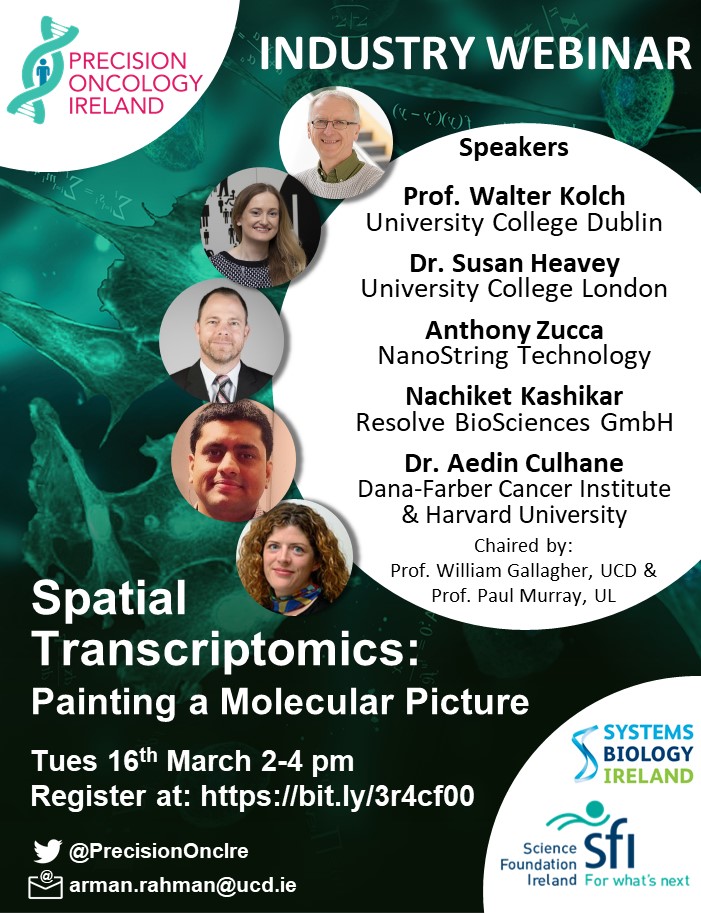
POI program announces a new research project studying childhood blood cancers
Published 19th October
Precision Oncology Ireland is happy to announce a new project focused on using precision oncology approaches to Childhood Blood Cancers. After a comprehensive review process earlier this year, the project spearheaded by Prof. Jonathan Bond was approved for funding in POI. The research project aims to utilize high-throughput approaches to understand molecular vulnerabilities in High-Risk Childhood Blood Cancers. The project is co-funded by POI’s existing partner, the National Children's Research Centre and Children's Health Ireland at Crumlin.
The project is due to commence later this month.
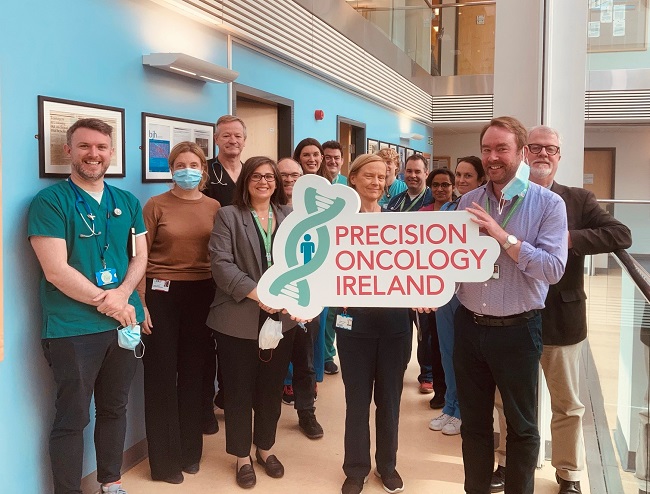
(Photo: Prof. Jonathan Bond, right, with members of the Childhood Blood Cancer clinical service at Children's Health Ireland at Crumlin. SBI’s Dr. Peter McCarthy and Prof. Owen Smith are also pictured.)
Professor Bond is a medical graduate of Trinity College and trained as a clinical haematologist in Ireland. He went on to do a Ph.D. in Molecular Haematology at what is now the London Institute of Medical Sciences, followed by a post-doctoral fellowship at the Hôpital Necker-Enfants Malades in Paris. Professor Bond returned to Ireland in 2018 to lead a new collaborative paediatric leukaemia research program between Systems Biology Ireland at UCD and the National Children's Cancer Service at Children's Health Ireland at Crumlin, where he also holds an Honorary Consultant Haematologist position.
When asked about the project, Prof. Bond said: "I am very excited about this project, which I believe will help us to find better treatments for some of the most aggressive paediatric cancers. It's also a huge boost for childhood leukaemia research in Ireland to be part of the POI consortium.”
In relation to how the project came about, he replied, “I would particularly like to acknowledge the funding support of the National Children's Research Centre and Children's Health Ireland at Crumlin and to thank all the people who have contributed to the Children's Health Foundation charity. Without their donations, this work would not be possible.
This latest addition of Prof. Bond’s project to POI truly adds merit and extends the scope of precision oncology to tackle a deadly disease that affects some of the most vulnerable members of our society.
The Precision Oncology Ireland team is excited to welcome Prof. Bond and his group to the programme and look forward to witnessing the research achievements that are to come following this announcement.
POI Communications Training: Breaking the Fourth Wall
Published 10th September 2021
POI Communications Training: Breaking the Fourth Wall
On the 25th and 26th of May 2021, POI hosted a Communications Training workshop, in collaboration with Breakthrough Cancer Research. The two-day, web-based workshop provided cancer researchers insights into communicating their science using accessible language. It also provided an opportunity for researchers to co-develop an accessible research summary alongside Public Patient Involvement (PPI) Representatives. The training was attended by 18 researchers from both POI and Systems Biology Ireland (SBI; the centre who coordinates the POI programme).
Event Summary:
In order to facilitate the training of POI researchers in science communication as well as providing them an opportunity to interact and engage with PPI representatives, in light of ongoing Covid19 precautions, the event was kept completely web-based.
Day 1 of training was facilitated by the FH Media Consulting team of Gráinne Faller and Louise Holden, who are experts in science communication and media training for researchers. Their workshop first introduced the participating researchers to the importance of communicating their science, the fundamentals of science communication, and useful tips and tools for developing a lay summary of their research focus. The participating researchers were then given time to independently work on drafting a written summary of their research in accessible language. Gráinne and Louise then worked with the researchers both as a group to discuss their research summaries and by providing 1:1 individualised feedback. After learning all about effective communication and working hard on their research summaries, participants left Day 1 of training with a fantastic starting point of an accessible research project summary.
Day 2 of the training session kicked off with co-facilitators from Breakthrough Cancer Research, Dr. Frances Drummond (Research Officer) and Orla Dolan (Chief Executive), and POI’s Shashank Srinivas (comm’s manager) and Dr. Jessica Ralston (Chief Operations Officer). After discussing the importance of patient involvement in research, the participating researchers were introduced to 11 PPI (Public Patient Involvement) representatives who had offered their time to assist the researchers in producing accessible research summaries. Intros were followed by a breakout room activity on Zoom where the researchers were each paired with PPI representatives. The aim of these breakout sessions was to give the participating researchers the opportunity to ‘road test’ their draft research summary from Day 1 and to co-develop a truly accessible research summary alongside a PPI representative. These breakout sessions were followed by a group discussion, where the PPI representatives individually described the research summaries discussed in their respective breakout rooms, which was a true test of how well the researchers were able to communicate their project descriptions! Day 2 of the communication workshop was closed off with a fantastic session on Infographics presented by one of the PPI representatives, Kay Mckeon. Kay provided the participating researchers with incredible tips and tools for developing engaging and accessible infographics.
Following the training session, there was an outpour of feedback from participating researchers about how meaningful and informative they found the workshop. A true highlight was definitely the opportunity for researchers to discuss their research with PPI representatives.
Since the launch of POI in November 2019, we have strived to involve and engaging cancer patients and patient advocates in our research programme as much as possible. Some may recall that POI participated in the PVCR ‘Dragon’s Den’ event in Galway back in February 2020, where feedback from PPI representatives encouraged POI to strive to present our research projects to public and patient audiences in an accessible way. This communications workshop in partnership with PPI representatives was an incredible way of working to achieve this goal of accessible research communication.
To read more about the ‘Dragon’s Den’ event which POI participated in, please do check out the blog written on the same here.
Having completed the communications workshop, not only do the participating researchers now have to hand an accessible summary of their research but our programme’s valuing and appreciation of PPI has been even further grounded. We want to extend our sincerest gratitude and appreciation to the PPI representatives and Breakthrough Cancer Research for their invaluable time, patience, and their unabated enthusiasm in participating in this event and their invaluable contributions and providing insights for the researchers to hone their science communication skills. From the feedback received by the participating researchers, one thing is certain; the researchers have found a renewed sense of duty in the importance of being inclusive in research science communication and an immense appreciation of the role of patients in cancer research.
The finished lay summaries from the POI researchers will be put up on the POI website on their respective project pages shortly – stay tuned!. A blog post from participants in the workshop will also be published shortly!
Marie Sklodowska-Curie COFUND Programme ‘DevelopMed’ Call 2 Now Open!
Published 1st October 2021
Call 2 of the ‘Developing the Next Generation of Research Leaders in Precision Oncology’ (DevelopMed) Marie Sklodowska-Curie COFUND Programme is now officially open and runs until 30 November 2021. The programme offers prestigious precision oncology fellowships to experienced researchers at the early stage of their careers.
DevelopMed, which is coordinated by Systems Biology Ireland (SBI) in UCD, entails an EU investment of €1.32 million. DevelopMed is a training programme that will support the development of high-calibre research fellows who are at an early stage of their careers. Fellows will be conducting research throughout Ireland in precision oncology within the themes of Diagnostics, Therapeutics & Drug Development, and the Tumour Microenvironment. Proposals may be in basic or applied research topics broadly classified within the aforementioned precision oncology themes (e.g. computational modelling, nutrition, obesity, machine learning, immunology etc).
The aim of DevelopMed is to develop the next generation of skilled researchers who will gain hands-on experience developing cross-disciplinary and entrepreneurial skills through individual research projects with a mandatory 3-6 month secondment at an accredited research organisation (academic, industrial, clinical and/or charity sectors) during their fellowship. DevelopMed Fellowships are for experienced researchers of any nationality residing worldwide, seeking a prestigious career development fellowship based in one of four leading Irish universities. Institutions hosting fellows include University College Dublin, the National University of Ireland Galway, University College Cork, and the RCSI University of Medicine and Health Sciences.
Fellowships include the opportunity to work closely with a number of relevant academic and non-academic partners of their choice and appropriate to their research, training, and professional career development. Information on eligibility criteria for applicants can be found here.
Furthermore, the DevelopMed programme supports gender equality in research and innovation. All DevelopMed academic partners have signed the Athena SWAN Charter, established to encourage and recognise commitment to advancing the careers of women in science, technology, engineering, maths and medicine (STEMM) employment in research.
Each DevelopMed fellow will be working with one or two academic supervisors. More information on Call 2’s list of academic supervisors and their research focus areas can be found here.
To learn more about the DevelopMed programme, the application process and how to apply, visit www.ucd.ie/developmed or follow us on Twitter at @DevelopMed_MSCA or contact us at developmed@ucd.ie.
SBI researchers embark on ground breaking clinical trial
Published 7th January 2022
In what is being hailed as a “milestone achievement,” a mathematical modelling system developed by Systems Biology Ireland (SBI) at University College Dublin will be used as a basis for treating pancreatic cancer patients in a Phase II clinical trial in the United States.
The mathematical modelling system was originally published in Cell Systems in 2018 and predicts drug combinations which work to inhibit cells with RAS mutations found in cancer.
“The model itself is a next generation dynamic model that allows the simulation of complex biological effects arising from the interplay of genetic mutations, biological network context, protein modifications, and protein structures,” explained Professor Boris Kholodenko, senior author of the Cell Systems study and Deputy Director of SBI. The model was developed as a collaboration between Systems Biology Ireland and the groups of Professor Richard Posner, Northern Arizona University, and Professor William Hlavacek at the Los Alamos National Laboratory, USA.
Professor Walter Kolch, Director of SBI and co-author on the paper, emphasized, “This model can really predict treatments tailored to individual patients. It is a big step towards SBI’s big vision of building ‘digital twins’ of patients that allow us to test treatments in silico and select the best one before we give them to patients.”
About 30 percent of all human cancers are driven by RAS mutations, which typically lead to very poor prognoses. The mathematical model developed in SBI predicts how oncogenic RAS signaling can be efficiently blocked by inhibiting RAF kinases, which are main transducers of RAS-driven growth signals. This has been tried before, but without success.
Pancreatic cancer, of which about 90 percent of cases have RAS mutations, is the focus of this clinical trial. The trial is titled “Phase II Trial of Vemurafenib and Sorafenib in Pancreatic Cancer” and is sponsored by HonorHealth Research and Innovation Institute of Scottsdale, Arizona, USA, with Bayer and Genentech, a Member of the Roche Group, as industry collaborators providing the drugs. It will recruit pancreatic cancer patients who - according to the predictions of the mathematical model - will benefit from the Vemurafenib + Sorafenib combination.
“This is the first clinical trial I’m aware of that is based on a mathematical model of signal processing,” Kolch said. “It took quite a long time to organise, about two years, and the efforts put in by the clinical team led by Dr. Erkut Borazanci and Dr. Daniel Von Hoff, were amazing. Only when I heard that we had finally been approved, did it dawn on me what a big milestone this is.”
The clinical trial was initiated by a group of researchers at the HonorHealth Research and Innovation Institute after the loss of a colleague, Dr. Nate Nieto. Nieto was a microbiologist at Northern Arizona University who passed away from pancreatic cancer in 2019, at the height of his research career.
If proven successful against pancreatic cancer, this clinical trial could lead to extensive applications in other RAS-mutant cancers, such as colorectal and lung cancer. The trial is taking place in the United States and the plan is to enroll approximately ten patients within the next year. The hope is that the first phase of this trial will work within about two years, and then the scientists can roll into phases two and three of clinical trials unhindered.
Further information:
The original Cell Systems paper, “Dissecting RAF Inhibitor Resistance by Structure-based Modeling Reveals Ways to Overcome Oncogenic RAS Signaling,” is available via: https://doi.org/10.1016/j.cels.2018.06.002.
This paper came out of an earlier paper first published by Kholodenko in 2015, in Cell Reports: “Drug resistance resulting from kinase dimerization is rationalized by thermodynamic factors describing allosteric inhibitor effects,” available via: https://doi.org/10.1016/j.celrep.2015.08.014
The clinical trial is available to the public online:
https://clinicaltrials.gov/ct2/show/NCT05068752?term=nieto+scottsdale&draw=2&rank=1
Other important contributors to this study include Oleksii Rukhlenko, Fahimeh Khorsand, Aleksandar Krstic, Nora Rauch, David Matallanas, and Jens Rauch, and the USA collaborators include Richard Posner and William Hlavacek.
This news item was originally published on the Systems Biology Ireland website on 7th January 2022
POI research team meets in person for the first time in over two years
The entire Precision Oncology Ireland team met in person recently for the first time in more than two years, as they held their team meeting at the Radisson Hotel in Cork on the 29th March 2022, prior to the Irish Association of Cancer Research Annual meeting.
The meeting kicked off with an introduction and welcome address from POI Director Prof. Walter Kolch, followed by an informal networking session to give new and old members of the team a chance to catch up and get to know each other.
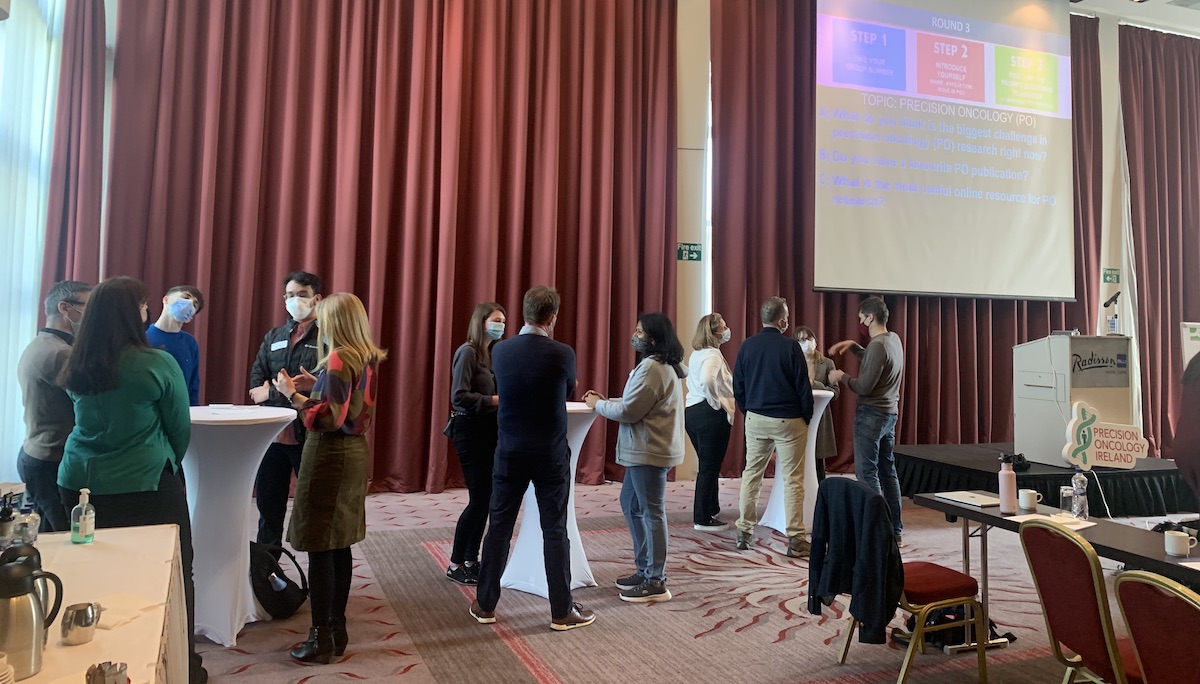
The afternoon was packed with informative talks from POI researchers ranging from early stage PhD students to senior research fellows, followed by a lively Q&A session and discussion. The meeting concluded with an interactive workshop focused on the past, present and future of POI, with team members providing their feedback on aspects of the programme that work well or not, and discussing the sustainability of the programme and its research projects into the future.
Conversations continued as the POI team repaired to the hotel bar for an entertaining social evening, an activity previously taken for granted, but sorely missed during the pandemic!
POI team members take home awards at IACR Conference 2022 in Cork
The 58th Irish Association for Cancer Research was held at the Radisson Hotel in Little Island in Cork, from Wednesday 30th March to Friday 1st April 2022, back in person after moving online in 2021 due to the pandemic.
The three day event showcased the exceptional cancer research being undertaken in basic, translational and allied healthcare cancer research across the island of Ireland.
The conference opened on Wednesday with the IACR Early Career Researcher Symposium, which included sessions focused on different career options in academia and industry, and highlighted the importance of role models and mentorship for a successful research career. The day concluded with a memorable public event in honour of the late Professor Patrick Johnston, where early stage researchers gave an overview of their work in lay format, prepared together with a cancer patient advocate.
Poster sessions over the three days demonstrated some of the excellent research taking place across the country, with PhD students, postdoctoral researchers and team leaders being awarded for their efforts.
Successful from the POI team were Dr. Luis Iglesias-Martinez, awarded a poster prize for his work on “Deriving personalised signaling pathways with deep learning and multi-omics data”, and Kathleen Mitchelson, awarded a prize for her poster “Saturated fat increases inflammation and disease progression through dysregulation of cellular and lipid metabolism in obesity-linked oesophageal and colorectal cancer”.
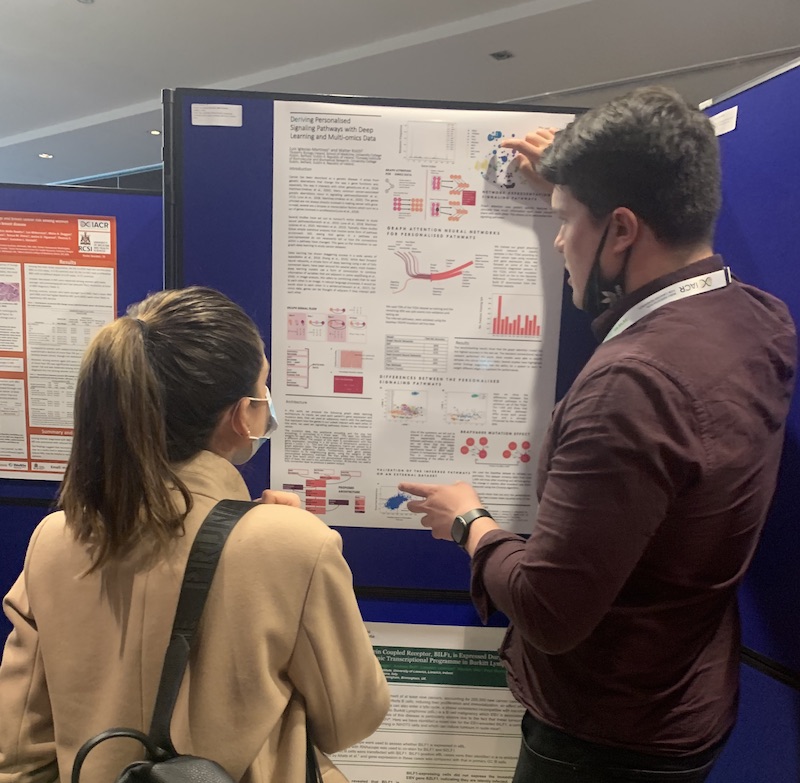
POI postdoctoral researcher Dr. Luis Iglesias Martinez presenting his prize-winning poster at the IACR Annual conference in Cork in March 2022.
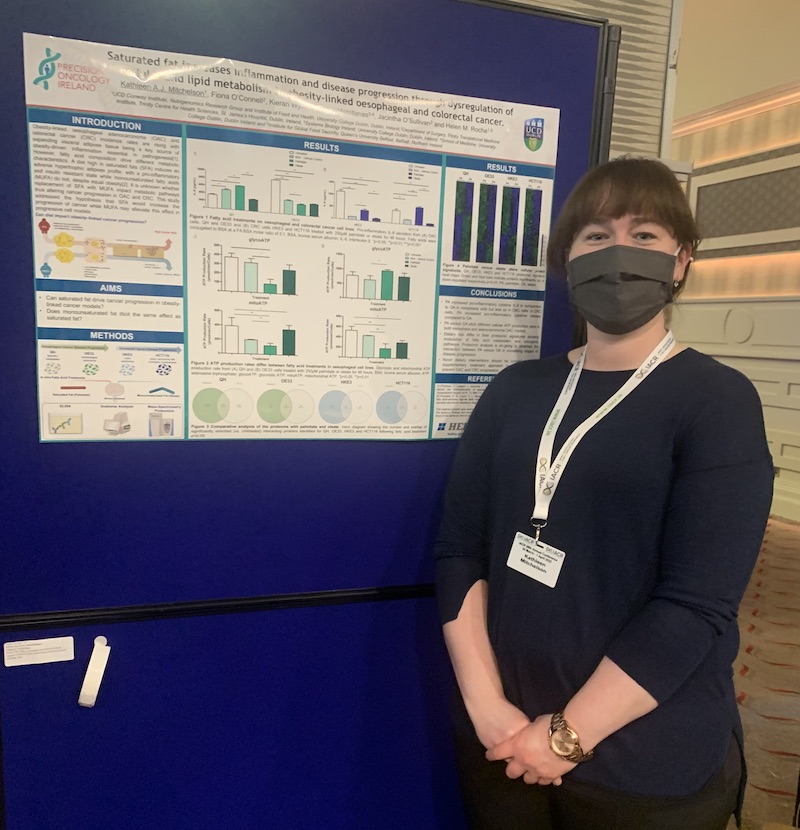
POI PhD student Kathleen Mitchelson with her prize-winning poster at the IACR Annual Conference in Cork in March 2022
The conference ran until Friday 1st April, when the IACR Award for Outstanding Contribution to Cancer Medicine and Research was awarded to Prof. John Reynolds from TCD.
Galway research community gathers to celebrate the journey of POI researcher Prof. Afshin Samali
Published 11th May 2022
In 1985, Afshin Samali arrived into Ireland as a refugee, having fled his home country of Iran, and knowing little about this small island nation on the western edge of Europe that would become his home. He would go on to become a Professor in NUI Galway, and a leading cancer biologist with a successful research career spanning over 30 years.
Colleagues, dignitaries, friends and family members of Afshin gathered in the O’Donoghue Centre in NUI Galway on the afternoon of Monday 9th May to celebrate his life and journey with the premiere of the documentary: ‘From Tehran to Galway: Professor Afshin Samali’s journey from refugee to cancer research scientist’. You can view the full documentary here.
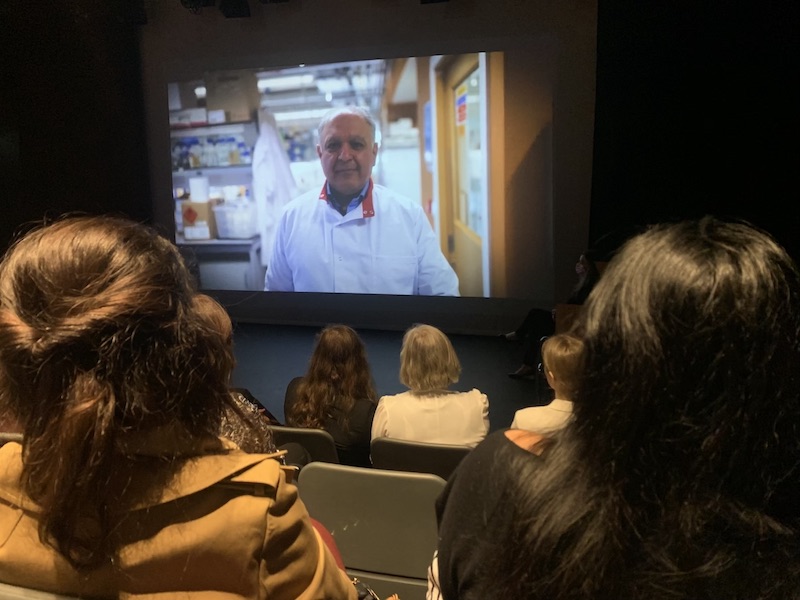
Scenes from the documentary screening
Afshin had a happy childhood in Iran, and his family led a privileged life. However, as a member of the Bahá’í faith, they faced persecution in Iran, which worsened following the 1979 Islamic revolution. The new regime denied the human rights of Bahá’ís, excluded them from work and education, and kidnapped and killed their leaders. Rather than renounce their faith, the family gave up everything they had in Iran and fled over the border to Pakistan in the dead of night, over treacherous mountain tracks. There, they claimed refugee status and were given protection by the UN Refugee Agency, the UNHCR. Eighteen months later, they were relocated to Ireland to start a new life in Sligo, on a cold December day in 1985.

Afshin Samali's family life in Tehran before fleeing as refugees
Afshin feels he has a responsibility to give back to those that helped him along his journey, and is sharing his story to inspire others who are in a similar position to where he started out, and to encourage people to accept and welcome refugees and their integration into society. He remembers the 1980s as a tough time economically for Ireland, with a lot of emigration from the country, and feels that the open welcome his family received despite this hardship exemplifies the generous Irish spirit.
His story is brought to life beautifully in the documentary through evocative illustrations of his journey as a refugee, and interviews with family members and those he has encountered along his path. Afshin has continued to work with the UNHCR in an effort to give back to those that helped him, and gives generously of his time to refugees who are starting out in their resettlement journey.
As NUI Galway President Prof. Ciarán Ó hOgartaigh said in his address: “It should not be a burden for us to welcome refugees into our community – we are the better for it”.
Precision Oncology Ireland are proud to count Afshin as a colleague and a member of our research team.
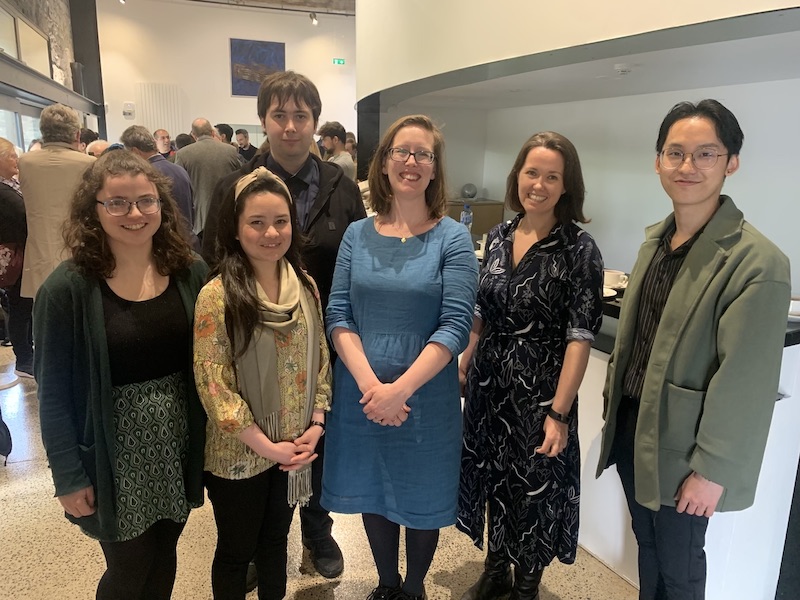
Members of Prof. Afshin Samali's research team with the POI Communications & Public Engagement Manager Dr. Fiona Lanigan at the premiere of the documentary at the O'Donoghue Centre in NUI Galway. (From L-R; Alice Bolger, Zarghona Hassani, Dr. Fiona Lanigan, Dr. Matthieu Moncan, Dr. Claire Robinson, Yew Hwang Chee)
POI researchers successful in SFI Frontiers for the Future funding awards
10th May 2022, Dublin

On 10th May 2022, Minister for Further and Higher Education, Research, Innovation and Science, Simon Harris TD, announced 76 grants valued at €53.7 million to support frontiers research across ten Higher Education Institutions through Science Foundation Ireland (SFI).
The research supported will investigate areas such childhood ADHD, future coastal sea levels, new generation batteries, antiviral drugs to treat Covid-19 infections, safety critical software, the link between obesity and cancer and the futureproofing of crops to withstand flooding.
In line with SFI’s gender strategy, the programme seeks to provide opportunities to address gender imbalance and to provide support for investigators returning to research after a period of leave. 42% of the research grants supported will be led by female researchers and 32% by emerging investigators early in their research careers.
The programme is run in collaboration with Geological Survey Ireland and the Sustainable Energy Authority of Ireland (SEAI) who are co-funding a number of the grants.
Successful from the POI team were Prof. Tracy Robson from RCSI and Prof. Jacintha O’Sullivan from TCD, awarded €910,324 for their research on “Breaking the Obesity-Cancer link; a theranostic role for FKBPL in modulating immunometabolism across disease progression in oesophageal adenocarcinoma”.
POI Investigator Prof. Jonathan Bond was also successful in obtaining funding, being awarded €479,985 for his research on “Unravelling epigenetic systems disruption in cancer”.
Dr. Colm Ryan from Systems Biology Ireland was also awarded €421,572 for his work on “Understanding and predicting context-specific synthetic lethality in cancer”.
Commenting on the SFI Future Frontiers Programme, Minister Harris TD, said:
“Congratulations to all the researchers who have received funding today as part of the SFI Frontiers for the Future Programme. I am delighted to support this programme which funds individual-led research, with an emphasis on fundamental research at the cutting edge of science and engineering which will help us build a better future for Ireland through discovery, innovation, and impact.“
“Not only will these grants support research in important areas for Irish society, they will also fund the support 216 people in varying research positions across 10 Higher Education Institutes to further develop their research careers. We are investing in talent. I would like to offer my thanks to the Higher Education Institutions for their support in delivering this programme again this year.”
Professor Philip Nolan, Director General of SFI said: “After the success of the first SFI Future Frontiers Programme in 2020, I am delighted to see 76 research grants awarded. The research programmes are wonderfully diverse, but they have one thing in common: they ask fundamental questions and will lead to important scientific breakthroughs, with important applications in areas such as climate action, biodiversity, human and animal health and digital transformation, with real and lasting benefits to our society and economy. The SFI Frontiers for the Future Programme is a key element of SFI’s new strategy – Shaping Our Future providing support for excellent research.“
“It is really encouraging to see that 42% of the research grants are led by female researchers for the second year running. SFI is committed to addressing the gender imbalance evident in areas of Irish research and this is another example of that commitment in action.”
Precision Cancer Treatment the Focus of a New Science on Screen Documentary
‘The People There to Catch Us’ tells the story of Tom Hope and Rachel O’Mahony, two cancer survivors who work alongside researchers at Precision Oncology Ireland (POI), to help improve the lives of others living with the disease. The documentary, produced by Ronan Cassidy of Carbonated Comet and Directed by Luke Brabazon, will have its world premiere at the Galway International Film Fleadh on July 7th 2022.
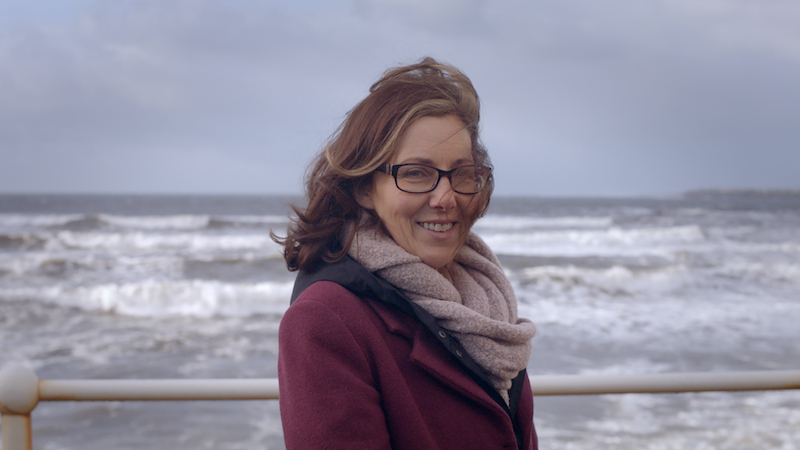
Rachel O'Mahony, Cancer survivor and patient advocate
This is the latest Science on Screen Documentary, a joint initiative between CÚRAM, the SFI Research Centre for Medical Devices at NUI Galway, and Ardán, the non-profit organisation across Ireland to support creatives within the audio-visual industry. ‘The People There to Catch Us’ was produced in collaboration with POI and the Patient Voice in Cancer Research (PVCR) and funded by CÚRAM, the All-Island Cancer Research Institute (AICRI), the UCD-Wellcome Institutional Strategic Support Fund (ISSF) and the National Breast Cancer Research Institute (NBCRI).
The film features Dr Róisín Dwyer (POI Investigator, NUIG), Prof. William Gallagher (POI Deputy Director, UCD Conway Institute and Co-Lead, AICRI) and Prof. Walter Kolch (POI Director, UCD) all of whom are focused on personalised cancer research at Precision Oncology Ireland.
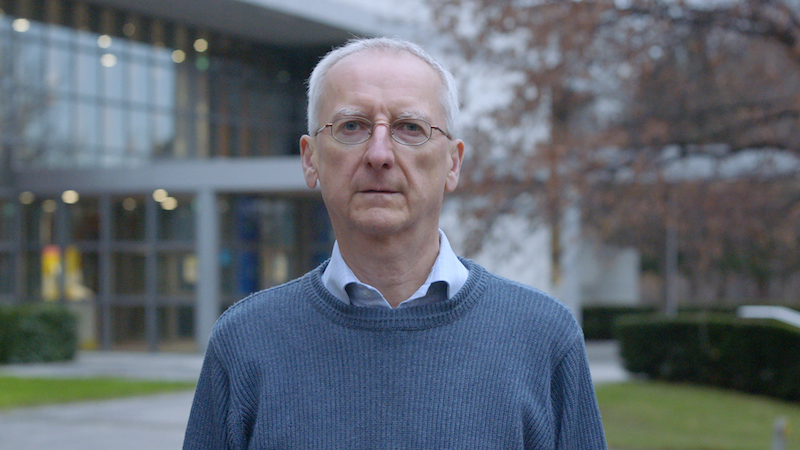
Prof Walter Kolch, POI Director
‘Precision Oncology Ireland researchers are working on developing a variety of targeted approaches to diagnose and more accurately treat cancer patients based on the exact type of disease they have and their own personal biology. In the past, cancer patients were only offered generalised approaches, such as chemotherapy, to tackle their disease, often leading to significant side effects. Our team is working hard to find unique characteristics of certain cancers that can be used to improve patient outcomes while lessening the challenge of side effects explains Prof. William Gallagher, POI Deputy Director and AICRI Co-Lead, whose own personal experience with cancer in his family continues to shape and motivate his approach to cancer research.
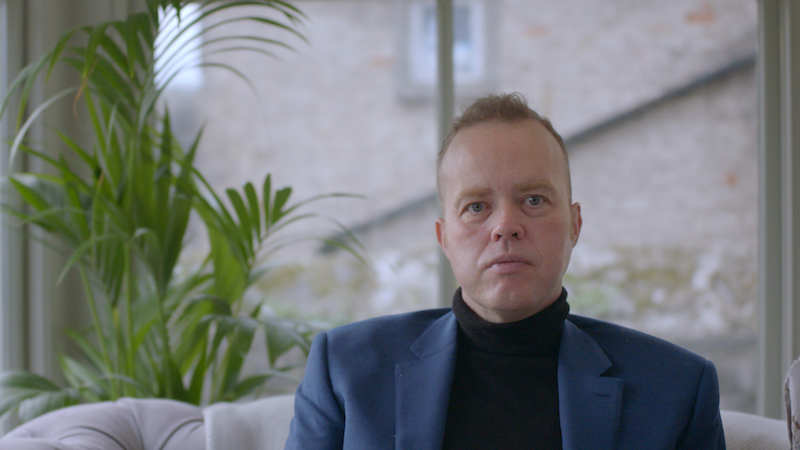
Prof. William Gallagher, POI Deputy Director and AICRI Co-Lead
‘We all have had some experience of cancer, whether directly or through family members or friends, and one in two of us will be diagnosed with cancer in our lifetime’, says Dr Róisín Dwyer, CÚRAM Investigator and POI researcher who has worked with Rachel O’Mahony in the years following her cancer diagnosis. ‘Patient contribution to the research process can have a huge impact and will help to guide the development of targeted therapies with less debilitating side effects so that patients can live full enjoyable lives.’
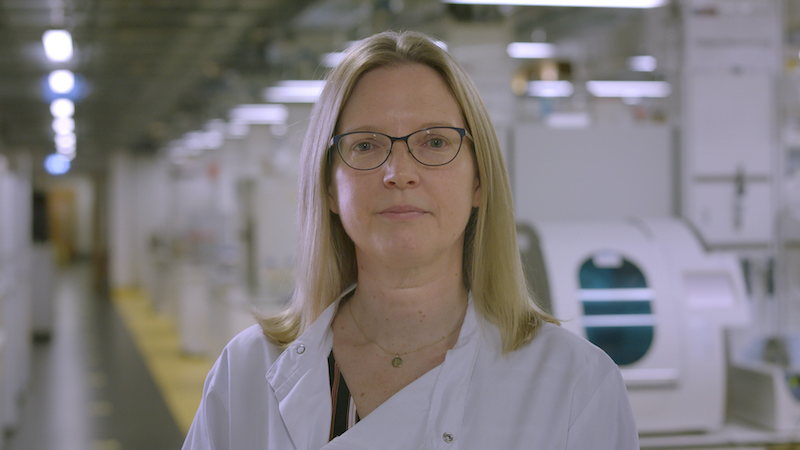
Dr Róisín Dwyer, CÚRAM Investigator and POI researcher
Tom Hope explains his role as a patient advocate, saying ‘I am now involved as a patient on a number of committees with oncologists, radiologists, urologists and scientists. Sharing my personal experiences, I have found that most medics don’t understand the anxiety that diagnosis and treatment can cause a patient and their family. In addition to occasionally discussing research with scientists and giving them the benefit of my lived experience of cancer, I have had the great pleasure of acting as a peer-to-peer volunteer and sharing my personal experience with men diagnosed with prostate cancer. In this way, I hope that I am giving them comfort that their experience is not unique, with supports being there to get through their treatment and live a normal life. A few comforting words telling you that you can get through this, can make all the difference,’ he says.
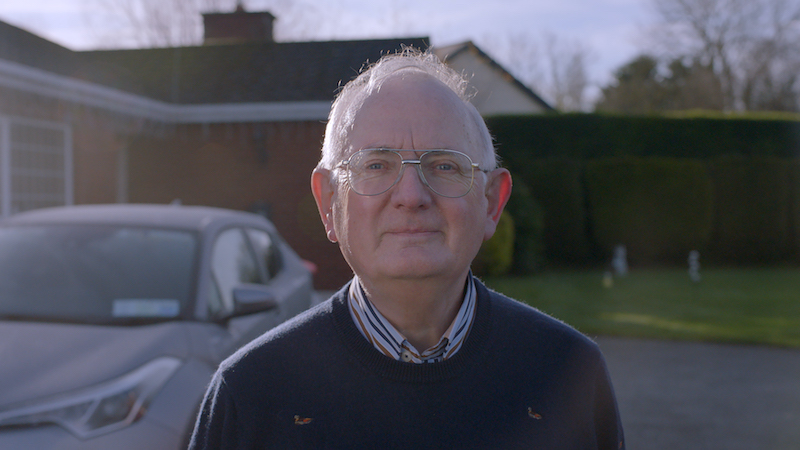
Tom Hope, Patient Advocate
Alan Duggan, manager of Ardán, said “We are incredibly proud to have worked with CÚRAM again and with POI through the Science on Screen initiative to produce this powerful documentary. We have all been affected by cancer in our lives in some way. ‘The People There To Catch Us’ highlights the human element involved in helping improve the lives of those living with the disease, while also focusing on the incredible work and research being done behind the scenes to combat the disease in more targeted ways."
The documentary shines a light on the lived experience of cancer survivors, their contribution to the research and the ongoing work of research centres like CÚRAM and Precision Oncology Ireland that will shape how cancer will be treated in the future.
‘The People There to Catch Us’ will screen at the Town Hall Galway at 10 am on Thursday July 7th 2022. Tickets are available from the Galway Film Fleadh website.
This is the seventh documentary produced through the CÚRAM-Ardán Science on Screen initiative, which aims to facilitate, promote and increase the inclusion of science, technology, engineering and maths (STEM) content in Irish film and TV production. The partnership began in 2016 with CÚRAM funding documentary filmmaking and providing access to leading scientists and laboratories within CÚRAM to explore methods of scientific ‘storytelling’ and to produce short films that incorporate current research at CÚRAM and its partners. These documentaries are available for community and educational screenings nationwide. Find out more on the CÚRAM engage website.
POI Research Showcase
Are you a member of the public with an interest in cancer research? Come along to our free Research Showcase! We are opening the doors at our research facilities in Dublin (UCD), Cork (UCC) and Galway (NUI Galway) to the public for one day only on the 22nd September 2022. Attendees will have an opportunity to tour the research laboratories, listen to short talks from some of the top cancer researchers in Ireland, and speak directly with researchers to ask all those burning questions!
You can register for this free event here.
Dublin event agenda:
Location: Charles Institute of Dermatology, UCD, 3-6pm
15:00 Arrival and Registration, with Viewing of Vicky Phelan portrait
Refreshments on arrival
15.45 Welcome address and Introduction to POI - Prof. Walter Kolch, Director, Precision Oncology Ireland
16:00 Keynote: Precision Oncology from a Patient Perspective - Jan Rynne, CLL patient and advocate
16.15 Keynote: Precision Oncology from a Clinician Scientist Perspective - Prof. Jonathan Bond, Professor of Paediatric Molecular Haemato-oncology, UCD
16.30 Flash research talks from POI researchers with Q&A (4 x 5 min)
17.10 Interactive Lay poster session & rotating laboratory tours
18.00 Close
Cork Event agenda:
Location: Cancer Research @UCC, 4th Floor Western Gateway Building, UCC
Time: 5-6.30pm
5pm Arrival
5-5.30pm Lab tours
5.30-6.30pm Interactive poster session with researchers over refreshments
Galway Event agenda:
Location: Lambe Institute, University of Galway, 5.30-7pm
Agenda TBC
Online Event agenda:
Zoom link to be circulated to all registered attendees.
15.45 Welcome address and Introduction to POI - Prof. Walter Kolch, Director, Precision Oncology Ireland
16:00 Keynote: Precision Oncology from a Patient Perspective - Jan Rynne, CLL patient and advocate
16.15 Keynote: Precision Oncology from a Clinician Scientist Perspective - Prof. Jonathan Bond, Professor of Paediatric Molecular Haemato-oncology, UCD
16.30 Flash research talks from POI researchers with Q&A (4 x 5 min)
17.10 Interactive Lay poster session & rotating laboratory tours (This section covered via Facebook Live)
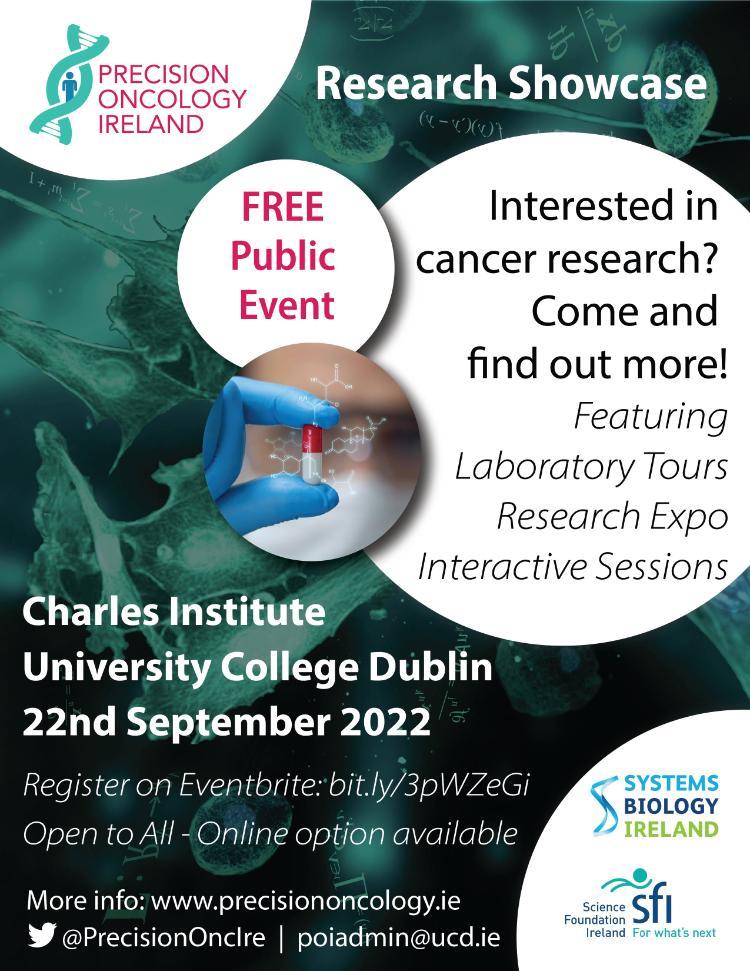
POI & AstraZeneca open day
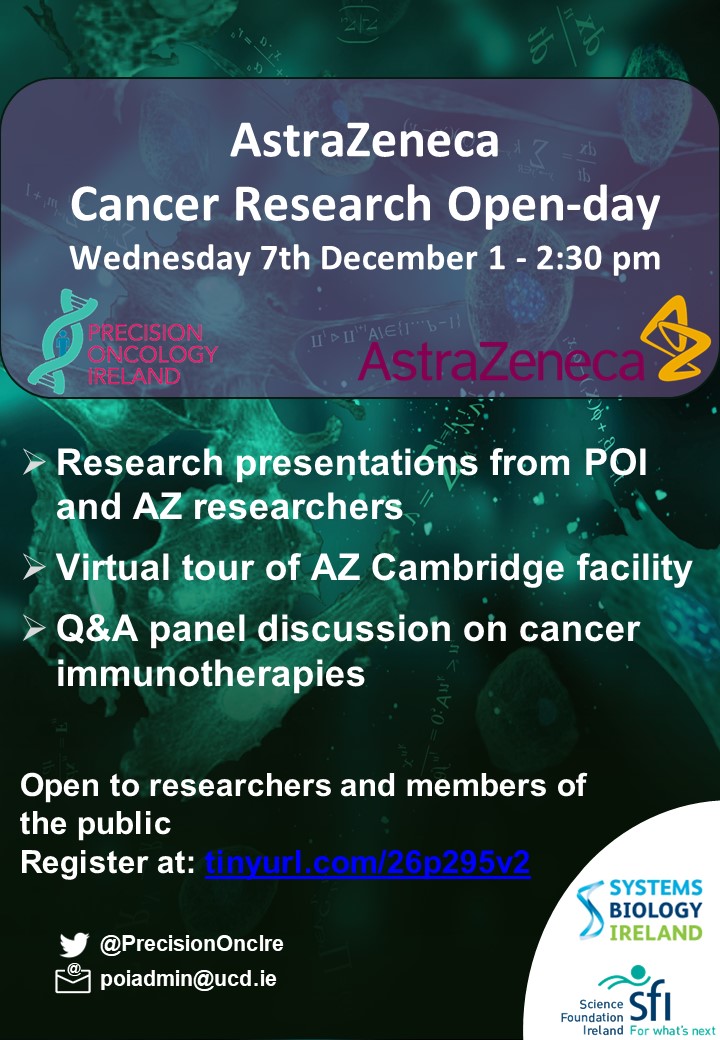
Choirs for Cancer 2023
POI is delighted to be helping out in the organistaion of this years "Choirs for Cancer" event! For the 4th time, choirs from around Ireland will join together in song to mark World Cancer Day (Saturday, 4th February). This event will honour all those whose lives have been touched by cancer and remember those we have unfortunately lost. Choirs for Cancer brings together cancer patients, family members, allied medical professionals and cancer researchers to share the story of their cancer journey.
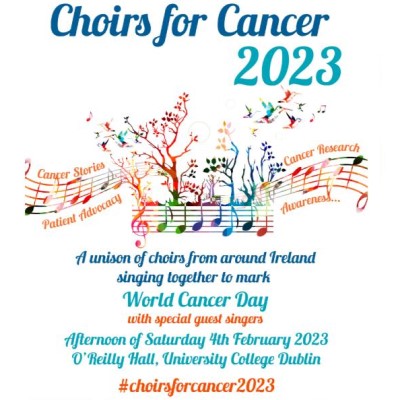
Featuring choir performances from;
Sea of Change Choir (Ireland’s Got Talent 2019 Finalists)
Sing for Life Choir (Northern Ireland)
Mount Sion Choir (Waterford)
UCD Community Choir
The Mellow Tonics Choir
With special guests;
Mairead Ni Mhaonaigh
Anne Randolph
Joe O’Sullivan
Stephen Bradley
The event will be held in UCD, Dublin and is completely free but you do have to register, which you can do by following the link below.
To get you in the mood, we've also included links below to where you can watch a short highlight video of the 2020 event and the full 2021 online event.
Choirs for Cancer 2020
Choirs for Cancer 2021
POI team meeting 2023
Last week was a busy week for us with both our annual team meeting as well as the 59th annual IACR conference, both held in Athlone.
It's always great to get the whole consortium together and we had great attendance from our early-stage researchers, PIs and charity and industry partners. Similar to last year's meeting, we combined research talks with programme updates, networking and engagements sessions, team discussions and finally a social event in the evening.
It was a highly productive and enjoyable few days and we have included some highlights below.
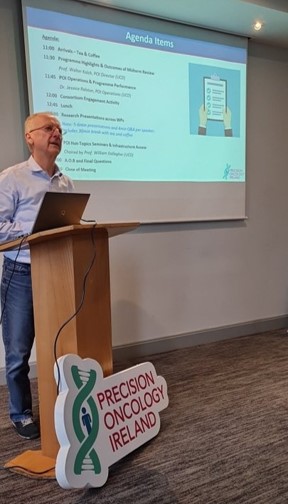
POI Director, Prof. Walter Kolch gave the opening address of the day, touching on recent successes within the programme including our exceptionally positive midterm review
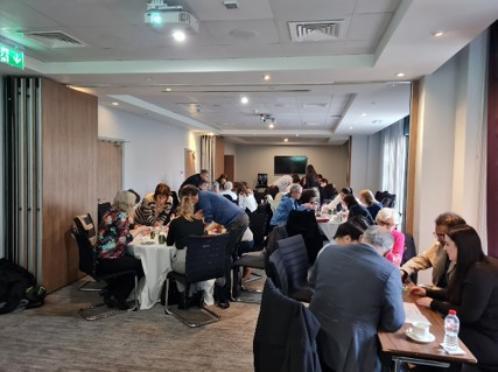
A networking and engagement session got everyone working together as a team
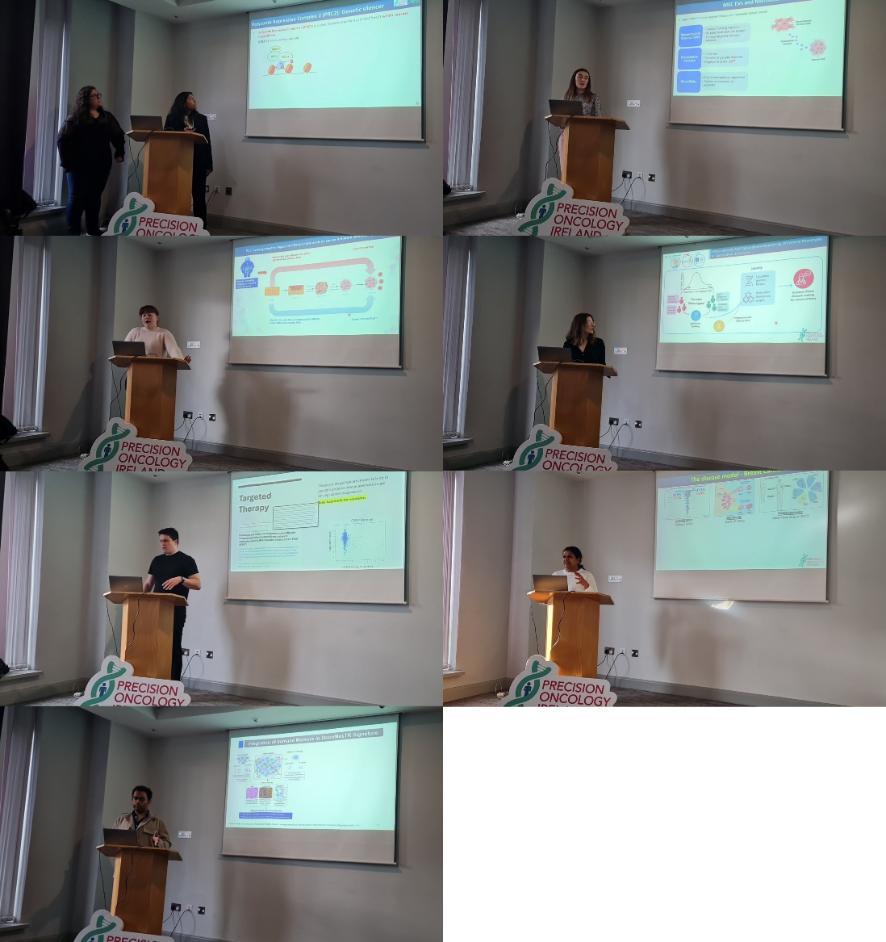
A series of research talks from our talented PhDs and postdocs. From top-left, Dr. Sharmila Biswas & Tania Dias (PI: Johnathon Bond), Elan McCarthy (PI: Roisin Dwyer), Kathleen Mitchelson (PI: Helen Roche), Dr. Lynda Corrigan (PI: Maeve Lowery), Dr. Luis Iglesias Martinez (PI: Walter Kolch), Dr. Vinitha Richard (PI: Michael Kerin) and Arif Jahangir (PI: William Gallagher)
Following on from the consortium meeting on Tuesday, many of our members remained in Athlone for the 2023 IACR conference. We were busy presenting posters, giving talks, hosting promotional booths and hearing all the fascinating talks taking place over three days.
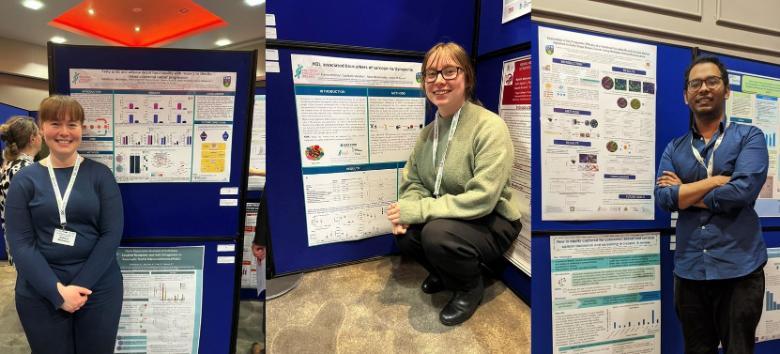
POI PhD researchers busy at the poster session. Shown above is Kathleen Mitchelson & Rianna McElroy (both of Helen Roche's group) and Arif Jahangir (William Gallagher group)
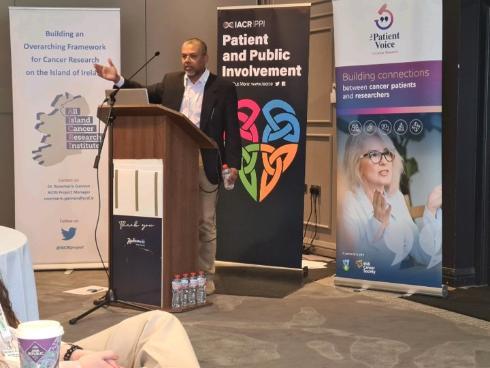
Dr. Arman Rahman spoke at the PPI workshop about his work in engaging ethnic minority communities in Ireland and promoting greater awareness of cancer screening programmes. It's always a great pleasure to work with Arman on this every year as part of our recurring Invisible Spectrum events.
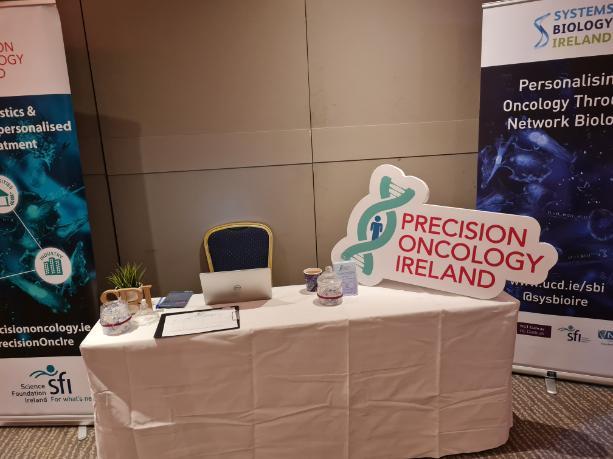
POI was delighted to sponsor the "Cultivating Career Competencies" workshop. Sitting outside the session in our promotional booth gave us a great opportunity to catch up with old faces and meet a few new ones as they came in and out of the workshop.
ESB Science Blast 2023
Have you ever wondered what household ingredients make the best slime? This was the question posed by one class of intrepid young investigators for this years ESB Science Blast, an annual science fair, facilitated by the RDS and open to primary schools from across Ireland.
POI administrator Shane was one of the judges for this years event, which featured thousands of primary schoolchildren and hundreds of separate projects. Each class, in conjunction with their teacher, selects their own project and then follows a 6- stage lesson plan designed to teach them the basics of experimental design, observation, data-collection, analysis and graphing.
POI has participated for several years running as judges of Science Blast. Some fascinating previous research topics we’ve had the pleasure of judging include “What’s the best energy food?”, “Does coloured paper improve learning?” and “What are the different benefits of seaweed?”.
POI is always supportive of anything to make science more accessible and exciting to all. Events like these gives kids first-hand experience in the highs (and lows!) of going through a scientific process of planning, investigation and analysis. And who knows, maybe after sharpening their scientific skills investigating the different kinds of slime, they’ll one day be applying those same skills to developing the next generation of cancer therapies!
You can learn more about ESB Science Blast at the link below.
https://www.esbscienceblast.com/
Learning to keep meticulous lab-notes from an early age
Prof. Helen Roche appointed as interim Vice-President for Research, Innovation and Impact
A huge congratulations are in order for POI Principal Investigator, Prof. Helen Roche on her appointment to the role of interim Vice-President for Research, Innovation and Impact. Taking over from Orla Freely, Helen will begin in her new appointment on 1st May.
Helen is currently Director of the UCD Conway Institute and Full Professor Nutrigenomics (Nutrition & Omics) at the UCD School of Public Health, Physiotherapy and Sports Science. She also leads POI project 1.2 "Biomarkers For Use Of Ghrelin Agonists And Nutritional Status To Treat Cancer Cachexia", supervising two PhD candidates.
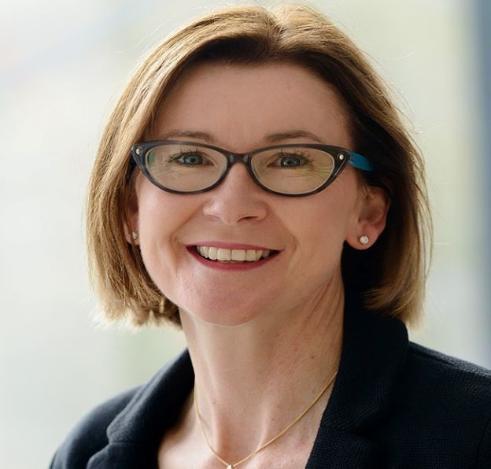
Speaking on this new task, Helen states: “Excellence is my key vision and mission – consolidating the existing strength and dept of research excellence within UCD is of key importance. Within this role, I am very much looking forward to supporting the UCD Research Community, building upon UCDs success to date. "
You can read more about Helens appointment here
Scientific Advisory Board meeting 2023
As part of ongoing efforts to continually improve and develop our programme, POI regularly receives advice and guidance from leading scientific experts who make up our Scientific Advisory Board (SAB). We recently held a 2-day session with the SA and after several years of online meetings due to Covid restrictions, it was wonderful to be able to invite the SAB panel to travel to Dublin this year to meet in person.
The 2-day long meeting featured updates on the POI programme, presentations from our researchers, a poster and networking session and private meetings with POI partners.
We would like to thank the SAB members for taking time out of their busy schedule to come visit us and share their expertise. We also want to give a big thanks to everyone who presented their work to the SAB, the POI partners who were there to share their experiences and everyone else who helped to make it such a success.
You can read more about our SAB panel and it's members at the link below.
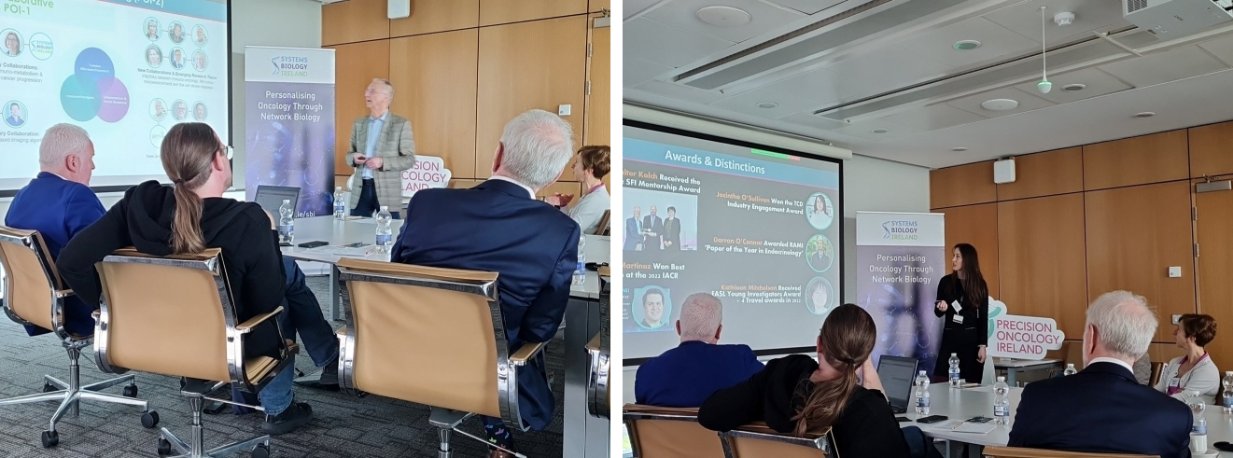
POI Director Walter Kolch (left) and COO Jessica Ralston (right) sharing an overview of POI success to date with the SAB
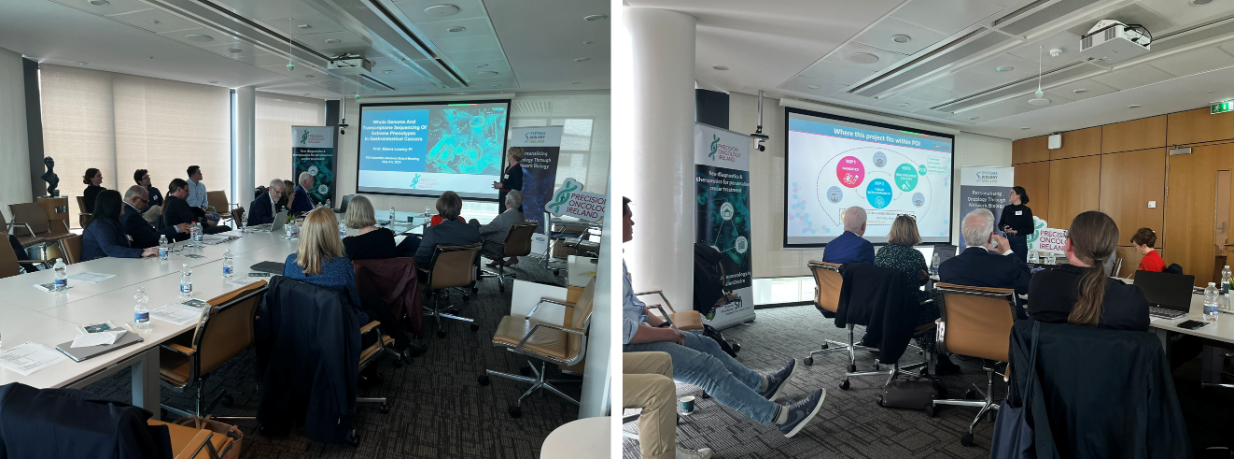
POI researchers Maeve Lowery (left) and Soraya Epp (right) presenting their research projects to the SAB
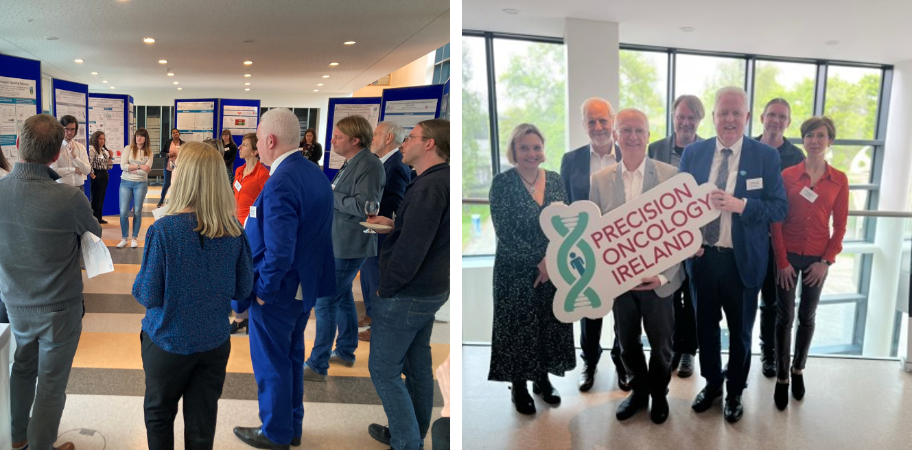
Poster and networking session (left). Walter with SAB members (right)
POI featured as SFI case study
POI was recently featured in an online article from SFI, as a case study on precision medicine approaches in research.
Walter spoke to SFI to provide some detail and context on the work being done in POI.
“Our aim is to bring the advanced technologies that help us with experiments at the lab bench all the way through to clinical trials with patients,” explains Professor Walter Kolch, Director of Precision Oncology Ireland and Systems Biology Ireland in University College Dublin. “Our research is enabling the search for new drugs, we are exploring how to make more informative cancer diagnoses and we are also looking at how the ‘micro-environment’ around the tumour affects how the cancer develops and responds to treatment.”
You can read more about the article here.
DevelopMed MSCA COFUND Call 3 Now Open!
Published 1st May 2023
Call 3 of the ‘Developing the Next Generation of Research Leaders in Precision Oncology’ (DevelopMed) Marie Sklodowska-Curie COFUND Programme is now officially open with a closing date of 25 June 2023. The programme offers prestigious precision oncology fellowships to experienced researchers at the early stage of their careers.
DevelopMed, which is coordinated by Systems Biology Ireland (SBI) in UCD, entails an EU investment of €1.32 million. DevelopMed is a training programme that will support the development of high-calibre research fellows who are at an early stage of their careers. Fellows will be conducting research throughout Ireland in precision oncology within the themes of Diagnostics, Therapeutics & Drug Development, and the Tumour Microenvironment. Proposals may be in basic or applied research topics broadly classified within the aforementioned precision oncology themes (e.g. computational modelling, nutrition, obesity, machine learning, immunology etc). Fellowships in Call 3 will be 24 months in duration.
The aim of DevelopMed is to develop the next generation of skilled researchers who will gain hands-on experience developing cross-disciplinary and entrepreneurial skills through individual research projects with a mandatory 3-6 month secondment at an accredited research organisation (academic, industrial, clinical and/or charity sectors) during their fellowship. DevelopMed Fellowships are for experienced researchers of any nationality residing worldwide, seeking a prestigious career development fellowship based in one of four leading Irish universities. Institutions hosting fellows include University College Dublin, the University of Galway, University College Cork, and the RCSI University of Medicine and Health Sciences.
Fellowships include the opportunity to work closely with a number of relevant academic and non-academic partners of their choice and appropriate to their research, training, and professional career development. Information on eligibility criteria for applicants can be found here.
Furthermore, the DevelopMed programme supports gender equality in research and innovation. All DevelopMed academic partners have signed the Athena SWAN Charter, established to encourage and recognise commitment to advancing the careers of women in science, technology, engineering, maths and medicine (STEMM) employment in research.
Each DevelopMed fellow will be working with one or two academic supervisors. More information on Call 3’s list of academic supervisors and their research focus areas can be found here.
To learn more about the DevelopMed programme, the application process and how to apply, visit www.ucd.ie/developmed, follow us on Twitter at @DevelopMed_MSCA or contact us at developmed@ucd.ie.
Invisible Spectrum poster presentation
The UCD School of Nursing, Midwifery and Health Systems recently held their inaugural research symposium. We were delighted to be accepted for a poster presentation to discuss our annual Invisible Spectrum programme. This annual event uses a co-design methodology to work with the local Bangladeshi community in Ireland to help promote their involvement in research, break down barriers preventing open discussion of personal health issues and improve attendee understanding and awareness of vital cancer screening programmes available to them.
This was the first time that some of this data has been presented in public and we were delighted with how much interest and discussion the poster generated.

In addition to all the great talks and poster presentations, the symposium also included a PPI (patient & public involvement) workshop focused on how best to engage with seldom-heard voices in research, which was the perfect topic to complement our poster presentation. It was a fantastic workshop with lots of great tips that we're excited to incorporate into our Invisible Spectrum programme!
Decoding Life: Conversations with a Computational Biologist
Prof. Walter Kolch was recently interviewed for an episode of the podcast "Decoding Life: Conversations with a Computational Biologist". The episode focuses on Walter's work in the groundbreaking concept of 'digital twins' in systems biology and its transformative role in the future of medicine.

The podcast can be accessed via any of the following links;
 Spotify: https://open.spotify.com/
Spotify: https://open.spotify.com/
 Deezer: https://www.deezer.com/us/
Deezer: https://www.deezer.com/us/
 Podcast Index: https://podcastindex.org/
Podcast Index: https://podcastindex.org/
Royal Society: Machine learning and AI in biological science, drug discovery and medicine
Earlier this year, the Royal Society hosted a conference on the applications of machine learning and AI technologies in biological research, drug discovery and medicine. Supported by our research partners, AstraZeneca, the conference included talks from industry, academia, government and charities. Prof. Walter Kolch was invited to both give a talk on his research on using digital twins in cancer research and a Q&A session, where he discussed topics such as bias and error, public data, patient-specific models, rare diseases and funding.
A summary report of the conference has just been published and can be accessed here.
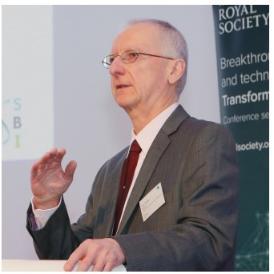

Left: Prof Walter Kolch delivers a talk on digital twins in cancer research.
Right: Walter in a panel discussion with Dr. Claus Bendtsen (AstraZeneca), Dr Anne Phelan (BenevolentAI) and Dr Imran Haque (Recursion Pharmaceuticals)
QBI/SBI Symposium on Molecular Networks of Cancer and Other Diseases
Following on from a years long partnership between Systems Biology Ireland, UCD and Quantitative Biosciences Institute, UCSF California, the 2nd "SBI-QBI Symposium on Molecular Networks of Cancer and Other Diseases" was recently held on UCD campus from Monday 16th to Wednesday 18th October.
POI was delighted to be here to not only lend organisational support but to also run two interactive workshops during the lunchtime sessions. On Monday, we held a collaboration workshop designed to spark conversations and forge new bonds between the international attendees of the conference. We look forward to seeing what results from the exciting opportunities created here. This was followed up on Tuesday with a patient workshop, where we were delighted to welcome patient advocates and representatives to join us in collaborative discussion sessions and provide vital feedback on our overall PPI and communications strategy.

POI Director Walter Kolch delivers an overview of the POI programme to conference attendees (left) and patient advocates (right) at the lunchtime workshop sessions
In addition to the workshops, it was great to also see so many POI researchers give fantastic talks over the course of 3 days. A big congratulations also to Soraya Epp who won the prize for best ECR presentation.
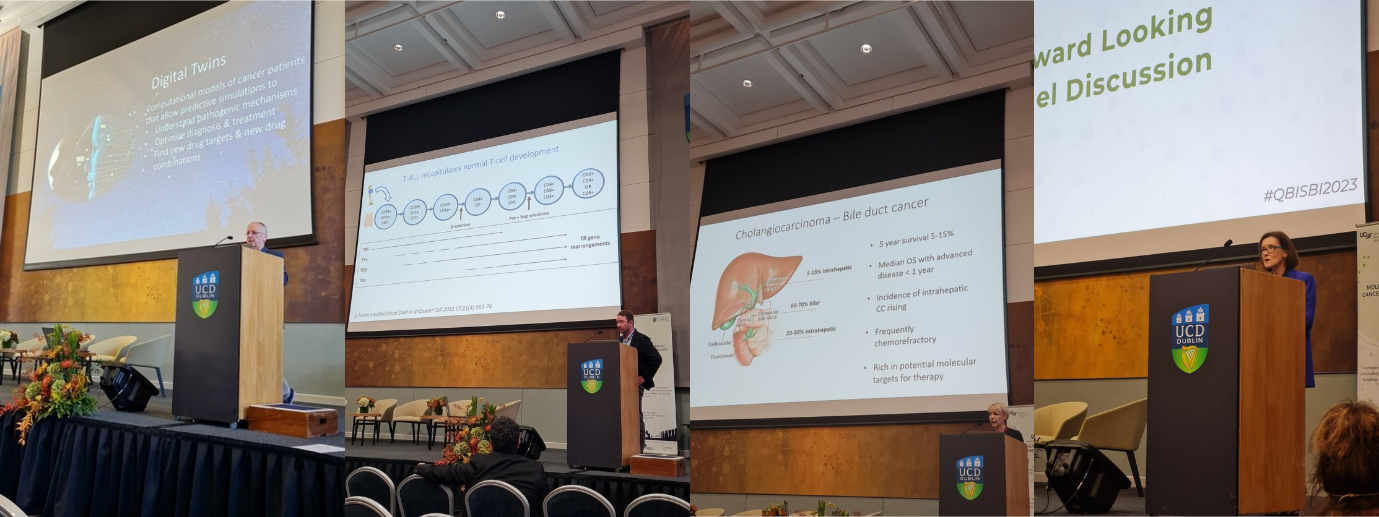

POI PIs (top row, left to right): Walter Kolch, Jonathan Bond, Maeve Lowery & Helen Roche. POI ECRs (bottom row, left to right): Tânia Dias & Soraya Epp
Invisible Spectrum 4
Our annual Invisible Spectrum returned in 2023 for the 4th time. Invisible Spectrum is an outreach and engagement event organised each year with the Bangladeshi community in Ireland. The goal is to help promote awareness of cancer symptoms, encourage uptake of cancer screening programmes, break down communication barriers between the attendees and the medical/scientific communities and encourage an interest in research amongst the attendees.
This year, we were delighted to host this annual event right here in UCD for the very first time. Similar to previous years, we organised a programme of talks, discussion sessions, Q&As and poster sessions. This year, we were also able to offer guided tours of the Systems Biology Ireland research facilities, allowing our attendees to get a glimpse of what a working lab looks like, see some live cancer cells down the microscope and hear from some of our young researchers on the important work they do and the cutting-edge techniques they utilise in their day-to-day work.
Thanks to members of the community who assisted with organising this event, all of our speakers and volunteers and Dr. Arman Rahman for his work in organising and in providing live-translations for all speakers.
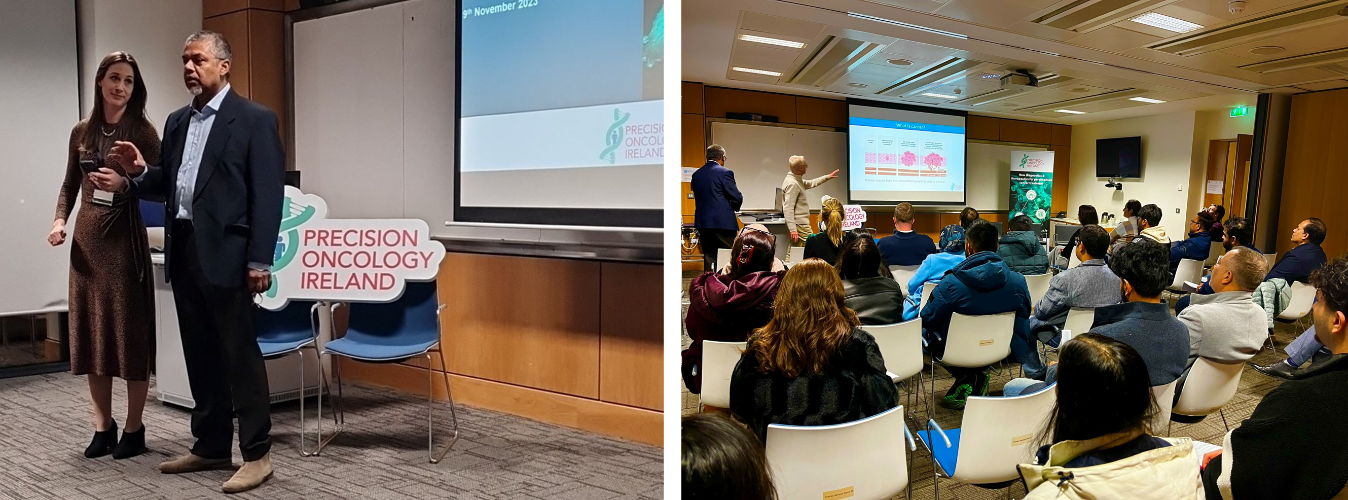
Welcoming address by Dr. Jessica Ralston and Dr. Arman Rahman (left). Overview talk by Prof. Walter Kolch
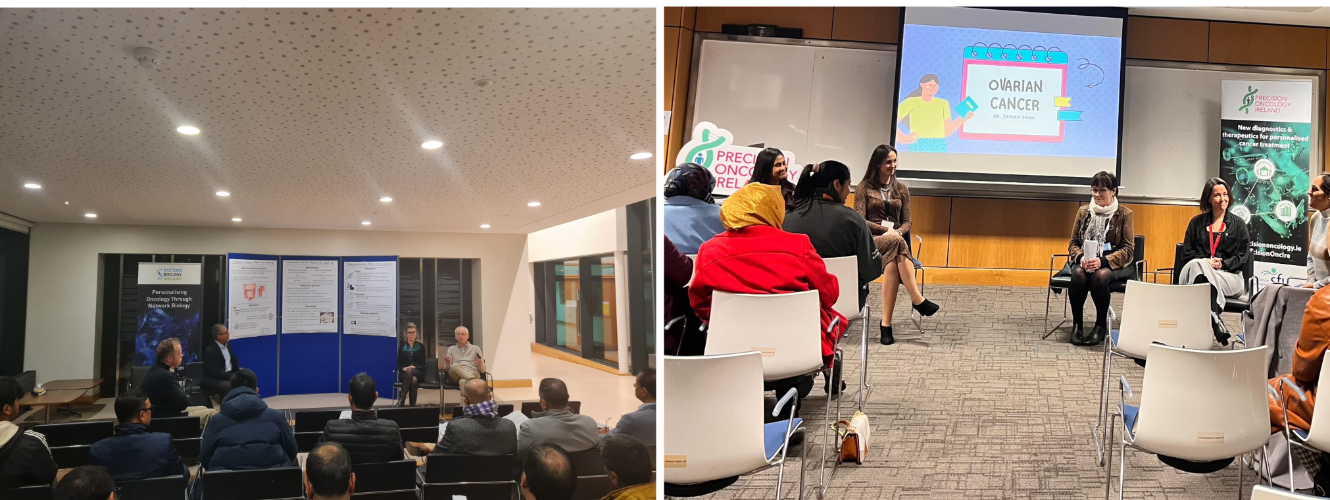
Cancer awareness discussion groups. Male group discussing colorectal cancer with Dr. Mary O'Reilly, Prof. Walter Kolch, Prof William Gallagher & Dr. Arman Rahman (left), women's group looking at ovarian cancer with Dr. Zahika Shah, Prof. Amanda McCann, Dr. Claire Robinson & Dr. Jessica Ralston

Invisible Spectrum attendees observing practical dmeonstrations as part of tour of SBI research facilities (left) and viewing poster presentations (right)
Enabling Precision Oncology in Irish Healthcare
As cancer therapy becomes increasingly personalised and tailored to individual patients, it's vital that we ensure that our healthcare system has the necessary capabilities to take advantage of this revolution in cancer care. We were delighted to recently host a 2-hour long expert panel discussion on this very topic. Organised in collaboration with Janssen pharmaceuticals and hosted in UCD, this event featured a panel of internationally recognised experts (listed below) assembled to look at the topic of precision oncology within the Irish healthcare system from different angles and perspectives.
Prof. Walter Kolch Director of Systems Biology Ireland (SBI) & Director of Precision Oncology Ireland (POI)
Prof. Donal Brennan Professor of Gynaecological Oncology, UCD School of Medicine & Consultant Gynaecological Oncologist, Mater Hospital Dublin.
Dr. Jerome Coffey Chairperson of the Board of the National Cancer Registry & Consultant Radiation Oncologist, St Luke’s Radiation Oncology Network
Dr. Nicoline van Leersum EMEA Precision Medicine Leader, Janssen Sciences Ireland
Jan Rynne Patient advocate & founder of Chronic Lymphocytic Leukaemia Ireland
Expertly moderated by Dr. Ronan Glynn (EY Consulting), this was a truly fascinating event examining a topic of vital importance to the POI programme from diverse yet complementary viewpoints. A full recording of the event is now available on our streaming website. You can access it clicking this link and registering.
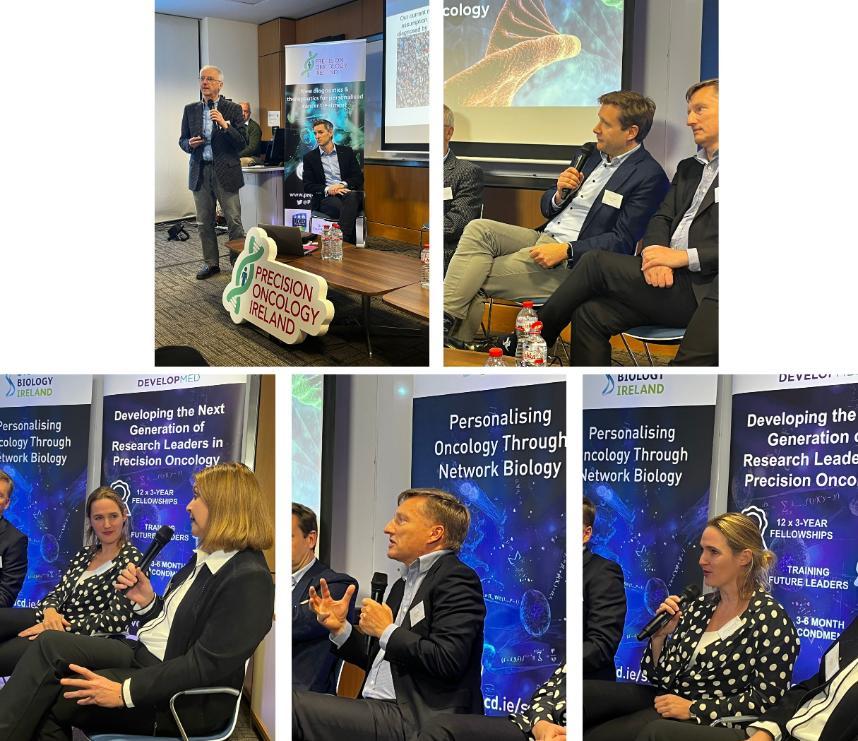
Panellists (left to right, top row: Walter Kolch, Donal Brennan, (bottom row) Jan Rynne, Jerome Coffey, Nicoline van Leersum
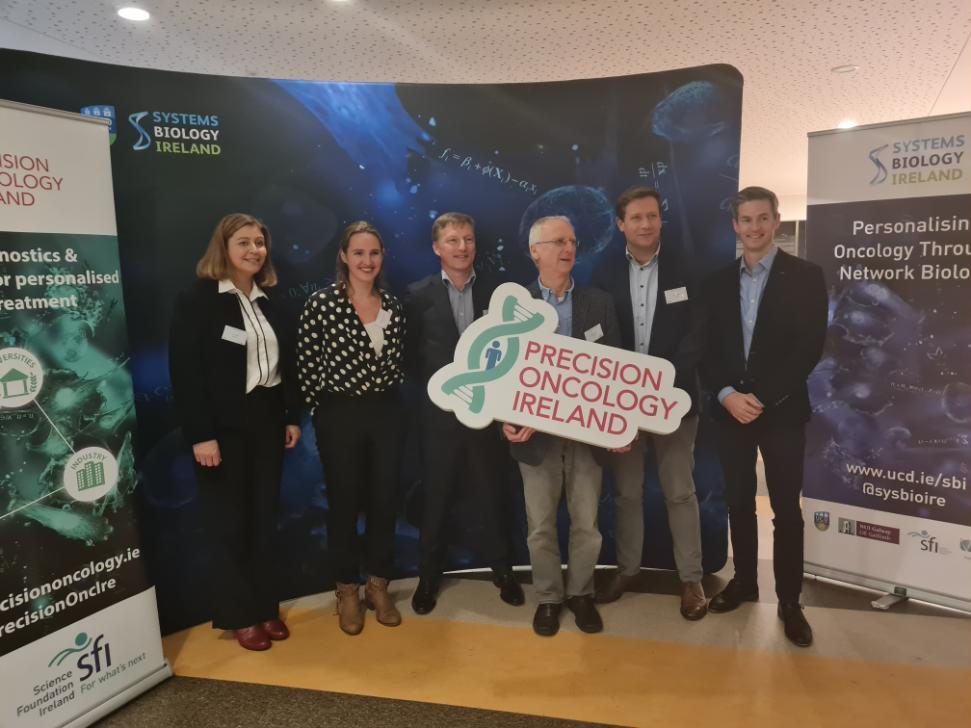
Congratulations, Dr. McCarthy
Our first PhD graduate! Huge congratulations to Dr. Elan McCarthy who sucesfully defended her viva last Friday.
Elan completed her PhD research under the supervision of Dr. Róisín Dwyer in University of Galway. Elan's project looked at micro-RNAs in breast cancer, you can read more about it here
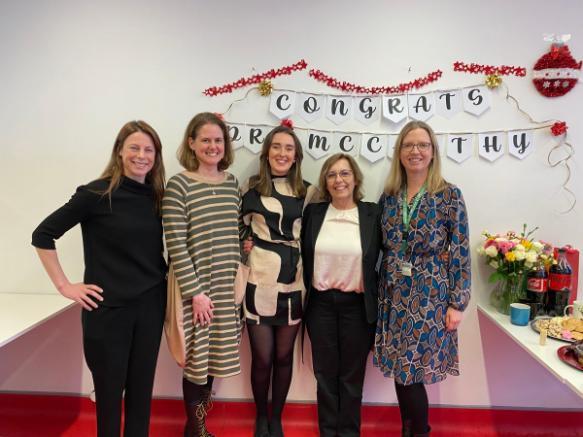
HRCI 2024 Position Paper
A recently released report by Health Research Charities Ireland (HRCI), a national umbrella organisation of over 45 charities in Ireland, has provided some excellent guidelines and recommendations for how we can all work to improve health research in Ireland. These 3 recommendations are based on the views of the HCRI board and members, results gathered from forum events, and engagement with many key stakeholders.
Recommendation 1: Increase capital expenditure in health research
Ireland’s level of Government-investment in research and development currently stands at just 0.29% GDP, putting us 5th from the bottom amongst OECD countries. HRCI are calling for a significant expansion in State funding to vital organisations like the Health Research Board (HRB) as well as research infrastructure in areas including digital health, clinical research infrastructure, research ethics committees, biobanks, patient registries and PPI supports.
Recommendation 2: Progress health research legislative reform
Updated legislation is required in a number of key areas which are currently hindering healthcare research in Ireland.
In matters of research ethics, where under-resourcing is leading to significant delays in research, the National Research Ethics Committees Bill would significantly reform the research ethics framework for health research in Ireland. Despite this promise, progress has stalled on this bill.
Similarly, the current legislation regarding research biobanks in Ireland is inadequate and hindering their development as a vital resource healthcare research. Many European countries have already updated their own legislation in this regard and could serve as a model for our own consideration.
Recommendation 3: Include health research charities and wider civil society in national research decision-making
The need to embed research within the healthcare system as well as increase public participation and engagement is well documented. Whilst there has been progress in this area recently, with the likes of the PPI Ignite Network continuing to improve links between researchers and the public, this progress is not reflected in all areas.
In addition to further public involvement, integration of charity group perspectives into matters of healthcare research is also key to widening research participation. The role of charities within healthcare research is substantial and stretches beyond simple provision of funding but also public communication of findings and advocating for community representation and relevancy.
The full report can be found here and we would encourage anyone with an interest in the area to give appropriate consideration to how you can help implement these recommendations.
Congratulations Dr. Kreileder
We were delighted to see our 2nd POI PhD researcher pass her viva recently. Congratulations again to Dr. Martina Kreileder, who sucesfully defended her thesis last Friday.
Martina completed her PhD under the supervision of POI Director, Prof. Walter Kolch with support from our industry partners at AstraZeneca
You can read more about Martina's research here

POI Team-meeting 2024
We recently held our annual team meeting right here in Dublin, during the combined AACR-IACR-EACR conference. It was great to get so many of our researchers and partners, from across the country together. Although we had a condensed programme compared to previous years, we still managed to fit in a lot of great talks, collaborative talks and future-planning.
We've included some highlights of the afternoon below

Director, Prof. Walter Kolch (left) and COO, Dr. Jessica Ralston provide updates on the scientific and operational management of the POI programme
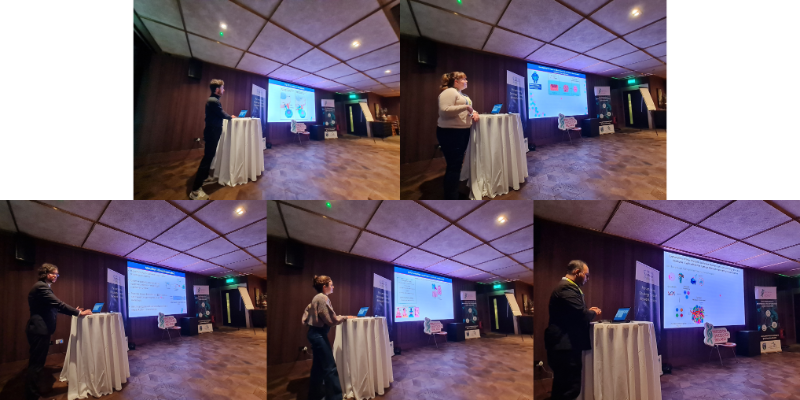
POI ECR presentations (left-right, top-bottom): Donagh Egan, Kathleen Mitchelson, Brandon Sugrue, Soraya Epp & Arif Jahangir
Team photos (clockwise): Early-career researchers, principal investigators, partners & whole consortium
Irish Cancer Society Awards 2024
The annual Irish Cancer Society Awards were held recently to highlight some of the truly excellent work being done by Irish Cancer Society funded researchers in Ireland.
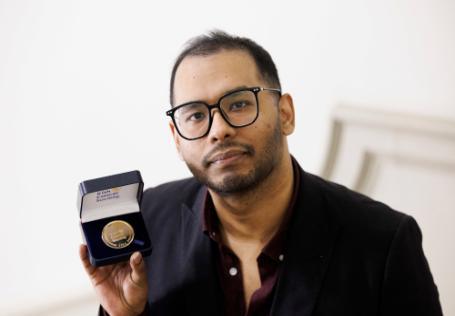 We were delighted to see the prize for "PhD of the Year" go to POI PhD researcher Chowdhury Arif Jahangir, who's research looks at tissue biomarkers in early-stage breast cancer. Speaking on his work, Chowdhury Arif Jahangir said: “My work focuses on a biomarker panel for early-stage breast cancer patients. Breast cancer patients are often prescribed chemotherapy after surgery to prevent cancer from returning to the body. In most cases, however, conventional tests in hospitals alone are not enough to reliably predict the likelihood of tumour reappearance. Therefore, many early-stage breast cancer patients who will not benefit from chemotherapy, still have to undergo this toxic treatment, with considerable side-effects.
We were delighted to see the prize for "PhD of the Year" go to POI PhD researcher Chowdhury Arif Jahangir, who's research looks at tissue biomarkers in early-stage breast cancer. Speaking on his work, Chowdhury Arif Jahangir said: “My work focuses on a biomarker panel for early-stage breast cancer patients. Breast cancer patients are often prescribed chemotherapy after surgery to prevent cancer from returning to the body. In most cases, however, conventional tests in hospitals alone are not enough to reliably predict the likelihood of tumour reappearance. Therefore, many early-stage breast cancer patients who will not benefit from chemotherapy, still have to undergo this toxic treatment, with considerable side-effects.
“To solve this problem, our lab has identified a panel of tissue biomarkers. In this case, measuring the abundance of these biomarkers in the patient’s biopsy samples can help us to successfully differentiate between high-risk patients who may stand to benefit from chemotherapy and low-risk patients who do not. Our hope is that through this testing, we will be able to prevent some patients from experiencing the often debilitating side effects of chemotherapy. ”
We were also delighted to see Dr. Arman Rahman featured as part of the winning team of Patient and Public Involvement (PPI) Champion of the Year Award. Alongside his colleagues, Arman worked to include under-represented voices from the Bangladeshi community in ovarian cancer research in UCD. We work closely with Arman each year on our annual Invisible Spectrum event, which also seeks to promote dialogue between minority communites and researchers.
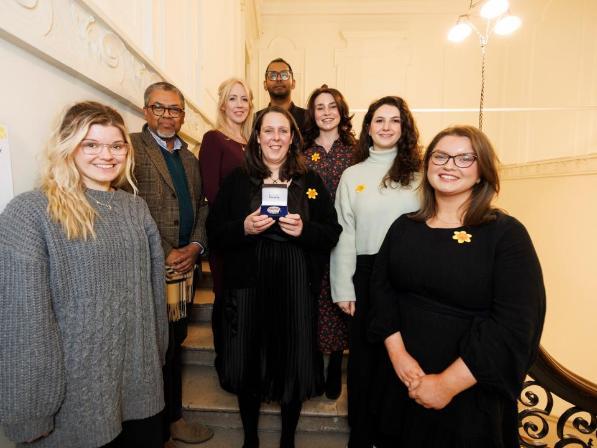
Arif and Arman were joined by Senior Researcher of the Year Award Winner, Dr Luke Jones (SBI, UCD) and Dr Erin Crowley, who won Support Staff of the Year Award.
Congratulations again to all winners!
* The quote and photos above was originally featured in a news article from the Irish Cancer Society which can be found here
The Lancet 2024 Series on menopause
An exciting new series of articles just released in The Lancet argues for a better understanding of menopause, using an evidence based approach to inform treatment, build more-empathic clinical care and provide women with better support during this life stage. Each of the 4 articles look at a different side of issues faced by menopausal women, with the final article in the series featuring Prof. Donal Brennan as senior author. Prof Brennan is an investigator in POI, a cancer research consortium coordinated by Systems Biology Ireland in UCD.
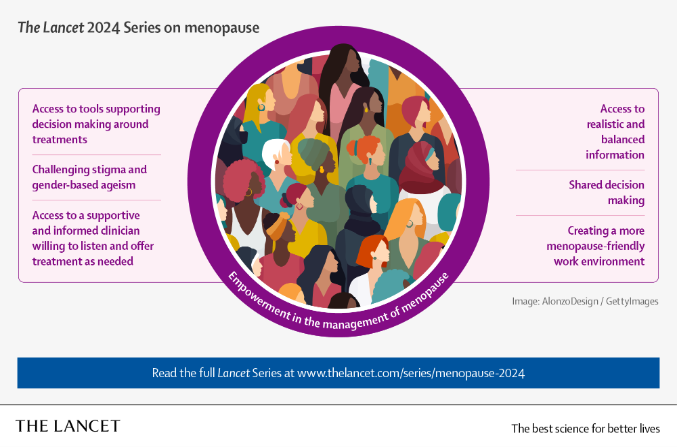 “Managing Menopause After Cancer,” from Brennan and colleagues identifies the impact of early menopause and the severity of menopausal symptoms in cancer survivors, providing evidence-based recommendations from the current literature toward implementing a more personalised and multidisciplinary approach in treatment of menopause symptoms after cancer. The review looks at a number of factors including patient cancer types, age, socioeconomic status and cultural practices at play.
“Managing Menopause After Cancer,” from Brennan and colleagues identifies the impact of early menopause and the severity of menopausal symptoms in cancer survivors, providing evidence-based recommendations from the current literature toward implementing a more personalised and multidisciplinary approach in treatment of menopause symptoms after cancer. The review looks at a number of factors including patient cancer types, age, socioeconomic status and cultural practices at play.
Brennan, who is Professor of Gynaecological Oncology in the UCD School of Medicine and Principal Investigator in the Precision Oncology Ireland strategic partnership programme, as well as a gynaecological oncologist in the Mater Misericordiae University Hospital in Dublin, is the senior author on the paper.
“Patients have repeatedly highlighted the burden of menopause symptoms after cancer treatment. They feel that these are often minimised or in some cases ignored,” said Brennan. “We hope that this paper will provide a summary of evidence-based approaches to treat menopause symptoms, including the use of HRT if indicated and more importantly stimulate more research in this area.”
The article comes at an important juncture in cancer research where cancer survivorship is improving, but the long-term effects of treatment and quality of life issues are coming to the fore. “Managing Menopause After Cancer” specifically looks at long-term effects of cancer treatment such as premature ovarian insufficiency and early menopause. The symptoms of these can be significantly challenging to patients as they may be more severe than the symptoms of natural menopause. Brennan and colleagues give a comprehensive view of the current hormonal and non-hormonal therapy options studied and suggest a framework for more cost-effective and patient-focused models of care to meet the needs of a growing population of cancer survivors.
Brennan’s group at SBI focuses on precision medicine solutions for ovarian cancer and cancer genomics. Brennan also works on examining the underlying molecular mechanisms of obesity induced carcinogenesis with other active research groups in UCD and St. Vincent’s University Hospital, Dublin. He also leads the Women’s Health Initiative project at the Mater Hospital, funded by the Irish Cancer Society, which focuses on the development of evidence-based survivorship services for women living with and after cancer and leads a number of clinical trials in the area of menopause and cancer. In 2023, he was appointed National Clinical Lead for Cancer Research in Ireland.
You can read Donal's paper and the rest of the Lancet Series here
Congratulations Dr. Mitchelson
Congratulations to our 3rd POI PhD, Dr. Kathleen Mitchelson on the successful defence of her thesis! Kathleen's research was completed under the supervision of Prof. Helen Roche (you can read about Kathleen's project here) and with support from Helsinn.
Thanks also to Kathleen's examination panel, with Prof. Walter Kolch and Prof. Michael Quante as examiners, and Dr. Ger Cagney as Chair.
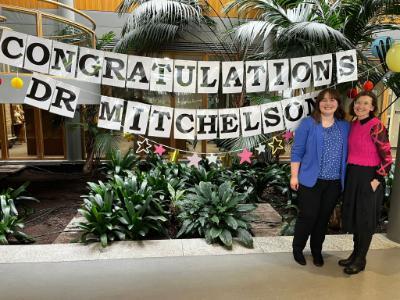
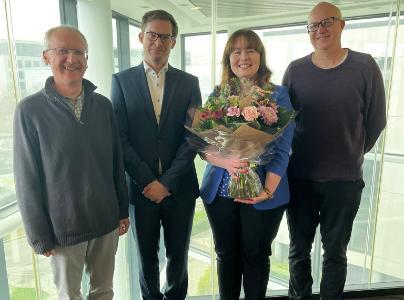
Scientific Advisory Board meeting 2024
We were delighted to once again welcome our Scientific Advisory Board (SAB) members to UCD last week, for our annual SAB meeting. Consisting of two days of research talks, poster sessions, strategic development discussions and networking, the meeting was a huge success and has left us with plenty of expert advice and guidance to continue developing the POI programme.
We thank everyone who attended, in particular our presenters (both oral and poster) who gave such a strong demonstration of the quality of science in POI, our charity and industry partners, who shared their experiences of POI with the SAB, and of course our SAB members themselves.
You can see some pictures from throughout the two-day meeting below as well find out more about our SAB members here.
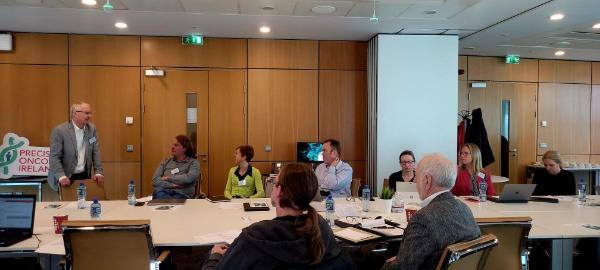
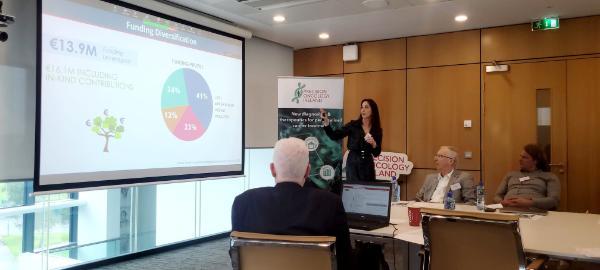
Prof Walter Kolch (top) and Dr. Jessica Ralston providing updates on the scientific and operational progress of POI

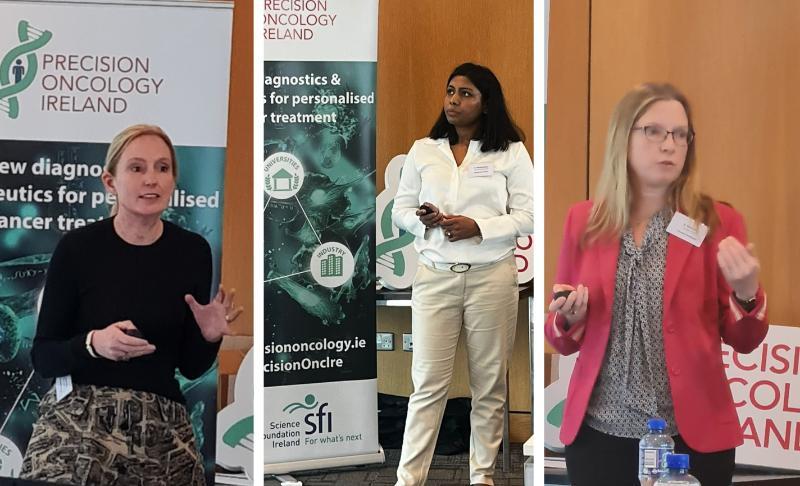
Scientific presentations from (top, clockwise); Chowdhury Arif Jahangir (UCD), Prof. Helen Roche (UCD), Dr. Vinitha Richard (UoG) & Prof. Walter Kolch (UCD). (Bottom, left to tight); Prof Leonie Young (RCSI), Dr. Sharmila Biswas (UCD) & Dr. Róisín Dwyer (UoG)
-800x800.jpg)
ECR poster session, with moderated posters delivered by (clockwise); Dr. Myriam Nabhan (UCD), Dr. Matthieu Moncan (UoG), Dr. Lili Lin (UoG), Dr. Kathleen Mitchelson (UCD) & Tânia Dias (UCD)

SAB with partners, PIs & Ops-team (left to right); Dr. Isabella Bray (CHI), Dr. Jessica Ralston (POI Ops), Dr. Eadadoin McKiernan (SBI Ops), Prof. Nils Blüthgen (Charité University Hospital, Berlin), Prof. Frank Gannon (QIMR Berghofer), Prof. Walter Kolch (POI Director), Prof. Mark Lawler (Queen's University Belfast), Prof. Markus Morrison (University of Stuttgart), Prof. Sara Zanivan (CRUK Scotland Institute), Dr. Eva Szegezdi (UoG), Prof. Jonathan Bond (UCD) & Dr. Shane O'Grady (POI Ops).

